#if you're addressing the audience As A Character. or like... even as a Very Fictionalized version of yourself (think like self insert)
Text
Rb'd that post that I reblogged another post saying it was dumb before I saw the original post. And the original was a fairly interesting take! And well-worded, and as I do, I went on a tag rambling about my thoughts.
And the more I went the more intensely I'm just like.
The fourth wall is the wall between fiction and reality!! Specifically!!! Between the story and the folks hearing a story!!!
If the streamer is acting In the way of a narrator, then that's... Almost valid? In the way narrators are sometimes also fictional characters in that universe. And are also telling you a story.
But it's not said a showman is breaking the 4th wall by addressing a crowd- but a storyteller might, even in person, if it served the narrative. It's not the screen- physically- that is a 4th wall, it's the wall between fiction and reality.
But dragon, you may ask, what of the roles We play as people?
And that's valid too! There's an argument to be made for, if you're actively fictionalizing yourself as a Streamer or Internet Entertainer, isn't it a fourth wall break?
And like. Maybe! If you're playing a character? I guess?? Like. But that doesn't make chat inherently a new 4th person pronoun- I genuinely don't know if this is a grammatical thing to begin with, tbh, or just something being used as 'a pronoun to refer to those on the Other Side of the 4th wall'
Though, it can be used in that way, in fiction. I've seen some games that have a steamer doing a stream type thing going, and if they used 'chat' there, It could conceivably be referring to a audience of a character.
#dragontalk#this is all rambling but imo The Like boils down to-#if you are addressing the audience as YOU- even a dramatized version- that's not a 4th wall break#if you're addressing the audience As A Character. or like... even as a Very Fictionalized version of yourself (think like self insert)#then yeah#it does break the 4th wall#but the argument for ot being a 4th person pronoun was resting upon the argument for it breaking the 4th wall. so it seemed.#and it's usually more of a “good and esteemed listeners of my ted talk” type context
2 notes
·
View notes
Note
Hey have you broken down Marinette's crush on Adrien and the ways in which it
A) misrepresents how teen girls get crushes on people they actually know and
B) sets Marinette up to seem really weird in a way the show literally cannot address because the universe thinks it's fine?
I know you can't prevent people from misinterpreting your show, but i think at the point where a significant portion of your audience and people with secondhand knowledge think of your main character as a stalker, that's a breakdown of communication on the writers part.
I've mentioned it offhand a few times, but I can go into it in more depth because it is a pretty massive writing flaw for reasons we're about to get into.
Marinette is not written like a teenager with a crush on her friend. She's not even written like a stalker. She's written like a teenager with a celebrity crush or a crush on a fictional character. In fact, if you go read fics from when the show first started airing, then you'll find that a lot of people assumed that Marinette's crush came from before she met Adrien or that it was rooted in a love of his professional work. That she was a fan who suddenly got to meet her idol and didn't know how to handle that.
I completely understand why that read was so popular. It's the only thing that makes sense! I assumed that was the case, too, until we got to Origins and her crush suddenly went from "obvious celebrity crush" to "crush with actual depth that's just been badly written."
While I'm ace, most of my friends are not, so I am very familiar with the experience of teenage girls getting crushes. I'm also deeply familiar with the experience of teenage girls getting crushes on celebrities and fictional characters. I, unfortunately, also know quite a bit about stalking. The three experiences are wildly different. For now, let's focus on the first two.
Celebrity crushes and crushes on fictional characters are experiences rooted in fantasy. You can be as over the top as you want because you know that nothing will come of this. You can go to a concert and scream the cute boy's name or have his posters all over your walls or publicly squeal about him with your friends without caring if people overhear because you don't expect him to ever care or even learn about your behavior. You know that you will never actually date him. He's a dream. A fantasy. A thing that will never be. That's the fun of this kind of crush. There's freedom in it. (This isn't unique to hetero crushes, btw, this was just an example based on my lived experience.)
I have strong memories of my best friend acting like Marinette, but only when it came to fictional men. When she was crushing on guys that she actually knew? The experience was wildly different because it was real. This could actually be a thing. She's not the only woman that I can say that about, either. I had many friends who had a celebrity or fictional crush and none of them ever carried that behavior over to their "real world" crushes. The stakes with the "real world" crushes were far too high for that sort of freedom.
Writing Marinette like someone with a celebrity crush is a terrible call on multiple levels. The most obvious issue is that it makes her look unhinged and creepy. While I don't agree with this take, I'm not surprised that people label her a stalker because celebrity crush behavior feels really creepy when it's applied to a person that you actually know. Whenever stories do the thing where someone meets their celebrity crush and actually gets to know them, there's normally a noticeable shift in their behavior as the character mentally goes, "Oh shit, you're real now." They lose the freedom that came with this being a mere fantasy.
The other issue with this writing choice is that it makes Marinette's crush feel superficial. The show spends hours letting her fantasize and obsess over Adrien, but rarely lets her actually spend time with the poor guy! It's incredibly awkward writing. You could have Adrien be a celebrity that Marinette never met and a lot of the episodes wouldn't change. That's not a great choice if your goal is to write an actual romance. Romances generally let the romantic leads interact.
As creepy and awkward as Marinette's writing can be, I will stand by my statement that she's not a stalker. She's nowhere near that unhinged. She's not stealing Adrien's things or following him home every day or breaking into his private spaces because she knows that they have a "special connection". We're never once made to feel like she's making him uncomfortable or harassed. Those are the kinds of things that stalkers do. They're delusional and divorced from reality. Do any of you really believe that Marinette would keep pursuing Adrien if he told her to back off? Hopefully the answer is "no" and, if so, then she's really not written like a "true" stalker because true stalkers just get dangerous when you say "no." They don't respect things like firm boundaries or restraining orders.
Watching Adrien's public appearances isn't violating his privacy and that's mostly what Marinette does. The rare occasions where she follows him somewhere private mostly revolve around someone else doing something questionable first, making Marinette's actions less "I want to see Adrien" and more "I'm worried for Adrien's safety and I'm doing something questionable because of that". The first is the behavior of a stalker, the second is... well, I'm not going to call it good behavior, but it's certainly not straight up bad behavior because the show isn't treating these moments as wrong so it's less Marinette being wrong and more the writers making really questionable writing choice. I mean, one of her break-ins was literally forced on her and orchestrated by her friend group! (See: Gabriel Agreste)
In fact, most of Marinette's creepiest behaviors fall under the "questionable writing choice" category as they're often just very obvious jokes of questionable quality. For example, I've seen people freak out about her having Adrien's schedule and it's like, guys, you do realize that was literally impossible, right? She claimed it was his schedule for the next three years! Nathalie doesn't even have that! You don't schedule things that far in advance unless it's a major event. It's impossible to take this claim seriously if you think about it for five seconds.
If you wanted to treat this schedule claim seriously and have it match the show's tone, then you'd have to tone Marinette's claim down, too. It would go from having his schedule for the next three years to just being aware of what he does on a weekly basis because they're friends and in the same class and you just sort of learn this stuff if you pay attention. How does Marinette know that Adrien has fencing on Wednesday? Because he has fencing every Wednesday. That's how this stuff tends to work.
I don't blame anyone for disliking the way that Marinette's crush was written. I don't like it either! It leaves a lot to be desired! The show would have been much better if they scrapped using Marinette's crush as the main source of comedy, but then they would have had to let Marinette and Adrien become close and we can't have that because it breaks the formula. The simple truth of the matter is that Marinette is written the way she is as a stalling tactic, which the episode Simpleman straight up admits:
Marinette: What am I doing, honestly? The truth is, I'm scared that Adrien will reject me if I tell him how I feel about him. That's why I over complicate everything, so that moment never comes.
In this scene, Marinette is claiming that this is a her thing, but it's really more of a writing thing. Miraculous is a formula show. Part of the formula is the akuma/sentimonster of the week and part of the formula is Marinette trying and failing to confess her crush. The show makes this pretty obvious, but if you want a more official source that this is what's going on, then here you go:
[The writing director] sold the Miraculous series to broadcasters as a formula show.... [This is why] Marinette tries to confess her love for Adrien in every episode, but is unable to do so.
They made Marinette's failure to confess part of the weekly formula which means that there can never be any romantic progress, thus Marinette being written like a fan obsessed with her idol instead of a teenage girl with very real feelings for her kind sweet friend. The first makes for an easy formula, the second won't work in that model. It requires there to be progress and a planned endgame. I'm not against formula shows, but this is a terrible element to make part of the formula!
The same issue plagues Adrien, too. It's the main reason why Chat Noir can come across as overly pushy. He's not allowed to move on just like Marinette isn't allowed to confess her feelings because they're the endgame couple. But we keep pushing back the endgame by adding seasons and so it's all become a total mess with terrible pacing and awkward, unhealthy relationships dynamics that really aren't suited to the genres or audience that Miraculous is clearly aiming for.
77 notes
·
View notes
Text
Interesting Characters Do Things the Reader Wouldn't Do
I've been thinking a lot about what makes an interesting character. As a topic, the variety of answers and strategies to creating interesting characters could be literally endless. But one element I've been dwelling on is based on observation of how characters who fascinate and delight us are the ones that do things in ways that we, the audience, generally wouldn't do them.
I'm thinking about this from two angles:
How to make characters who do things the average person wouldn't do (in an interesting way).
Why derivative works like fanfic often experience character drift, where over time, the character who does unusual things and has unique reactions in canon drifts away from having these unique characteristics, and becomes increasingly generic and/or like the author.
Let's address Point 1 first. The way to make a character who does things in an unusual manner is, in theory, to make a unique environment and/or a unique character (bonus points for both).
For example, a unique environment is core to many exciting fictional narratives. Most of us don't have to grapple with what we would do, for example, if we were faced with a Bad Guy Who Wants to Destroy the World That Only We Can Stop.
Or, on a less "epic" level, most of us on average don't have to deal with, say, the whacky hijinks that formulate the meet-cute in a romcom, even the more mundane ones like spilling our coffee all over a beautiful stranger and scrambling to make it right, leading us to the love of our lives. These in general are not daily occurrences, so it's immediately interesting to see how the character would handle the situation, even if they do so in a sort of "average" way.
For example, in my mind, the "average" way you respond to a Bad Guy Who Wants to Destroy the World That Only We Can Stop is to step up to stop the bad guy. If you're really the only one who can Stop the Bad Guy, I think the all of us would at least like to think we would accept this challenge, especially if The Fate of the World was objectively, provably, at stake.
Now, I think with this example, creative types can spot the issue right away. The hero who heroically does what we average people hope we would do in such a crazy scenario, step up and help save the world, is actually really boring.
Your typical Good Guy Protagonist who does the Typical Thing when faced with this Very Generic Plot is really goddamn dull. There's a reason these heroes who help propel their Gang of Heroic Misfits to actually Fulfilling the Plot and Saving the World are usually saddled with a Comedy Relief Character and at least one person who voices misgivings (usually with some degree of sarcasm or humor) about the risks involved with volunteering to save the world.
Han Solo in Star Wars, Jack Sparrow in Pirates of the Caribbean, are beloved characters because they don't leap to Save the World and Fulfill the Plot. Instead, they do unexpected, unique things. They're in it for themselves and that colors their reactions away from generically Doing the Right Thing. They want things like money, or safety, or more rum. They want less impressive human things that we can nonetheless relate to, and they pursue those things with a level of style and humor that the protagonist, like Luke Skywalker or Will Turner, are not necessarily afforded as our generic Audience Stand-In/Hero because their job as The Hero is to go on a hero's journey, increase their skills over time so they can learn things and strive at the same pace as the plot progresses and, in general, are saddled with Fulfilling the Plot.
Now, that doesn't mean the main hero/protagonist always has to be boring. It is possible to have a protagonist tasked with Saving the World who isn't boring. But this requires they address the problem in a way the average person wouldn't. This doesn't necessarily mean rejecting the call to save the world, by the way. What it often means is going about saving the world in a way that is unique to them or that shows a unique understanding of how to respond to the threat, in perhaps a more subtle or roundabout way other than just going the most obvious direct route.
One way to figure how to make a hero who goes about Fulfilling the Plot in a more interesting way is by making them want something in addition to their desire to save the world.
For example, Newt from Pacific Rim, the Kaiju-obsessed scientist (while not technically the hero of Pacific Rim's A Plot, I see him as the protagonist of the B Plot) wants to save the world, obviously, he's one of the idiots who lives there. Everyone in the story of Pacific Rim, particularly those in the Shatterdome, want to save the world, that's a given. How they go about it is what makes them unique. What they want in addition to saving the world makes them unique. Newt wants to study Kaiju and is obsessed with them on a level that is comparable with his drive to save the world. This colors how he goes about saving the world, by sticking to his specialty of studying and understanding Kaiju.
While the most obvious way to save the world in Pacific Rim is to jump into a giant robot and go punch Kaiju, which is what our A Plot protagonist Raleigh Becket does (and he is, apologies to his fans, a bit boring as a result), Newt's B Plot protagonist way of going about this shows that the problem is bigger than one hero offering one simple solution can provide, which helps expand the world and the scale of the threat. And there are many interesting (arguably more interesting) ways to address this threat than being the butt-chinned golden boy jumping in a giant robot to offer the most direct solution to the problem. As a result, to me at least, Newt is a more interesting protagonist, because his entire personality isn't based on the most obvious, direct way to Accomplish the Plot (like Raleigh's is). Instead, he wants and likes other things too, specifically Kaiju, and thus he goes about Accomplishing the Plot in a less generic way that includes his special interest.
To go back to the romcom example, likewise, just to show that an epic plot isn't necessary to accomplish an interesting character, I think it can safely be said that the average, generic thing that your average sane human being would do if they accidentally spilled coffee on a beautiful stranger (thus kicking off the romcom) would be to apologize and help them clean it up.
That is, as noted, boring as hell. Because it's what anyone would do, by the way, what anyone should do in this circumstance.
Fiction doesn't need to be an object lesson. We know the script of what should happen in this scenario, so we are immediately interested if it's not what happens.
The manic pixie dream girl who, instead of simply apologizing and helping to clean the spill, instead grabs the protagonists' hand, rushes them out the door and declares they're being chased by spies, quick, come with me we have to hide! all out of an attempt to help the protagonist get out of the embarrassing situation so she can help them clean up somewhere else is at least slightly more interesting than the average polite response. If we dig into it to find out why she came up with such a bizarre response to helping someone clean up, instead of doing the generic thing, we begin to unlock a more intriguing character. Maybe her therapist just told her get out of the rut she's in by treating her life as an adventure and she took the advice a bit too literally. Why was she in therapy? Well, presumably we'll find that out as the story progresses, but at least now we've got a hook to wanting to know more (how effective such a hook would be is up to you).
TL;DR Characters who go about Fulfilling the Plot in a way the average person wouldn't, because they want something else just as much if not more, is an immediate recipe for making a more interesting character.
Now, Point 2, the character drift back to the center is also worth examining. I see it happen quite frequently, both in individual fanfics, in ongoing mainstream franchises, and in fandoms in general. This isn't quite the same as Flanderization, wherein complex characters get boiled down to simplistic reads of their crazier attributes. Rather, what I'd like to look at is when unique characters do the opposite, and increasingly act and behave the way the average person would. Or rather, the average person who matches the demographic and community of the writer.
An example that springs to mind is when a complex, indeed, Problematic character begins to open up about their emotions in fanfic, and speak and act in line with the most cutting edge progressive terminology, or in general talk about their emotions like they're a therapist. Characters who would rather die than show weakness in canon suddenly saying things like, "I'm sorry I got angry with you, I realized it's because of unresolved issues with my father and also, I am attracted to you, which made me self conscious about my appearance when I am around you. Please accept my sincere apologies. Perhaps we can discuss our relationship and consider becoming romantic partners?"
Obviously I'm exaggerating here (unless the character is an android). But while really no one in the real world talks like this, I'm going to refer back to the Saving the World example about how the generic thing we wished we would do when faced with such a conflict is actually the most boring response for a character.
We all hope, I think, that if we hurt our romantic partner's (or romantic prospect's) feelings, we would find the courage to apologize, explain ourselves, and do so in a way that was dignified for us and effective with them. How to do that is another question. What to do when we have imperfect knowledge is a question. What we do when we want something else more is a question and with characters, it's the more interesting question.
Perhaps the protagonist wants to apologize and would love to find a way to be romantically involved with their love interest, but they have no reason to believe the apology would be accepted, their dignity would remain intact, or that revealing the truth would culminate in a relationship rather than a painful rejection. Now you begin to have conflict, which is the stuff stories are made of. If the protagonist wants to save face more than they're willing to risk that rejection, instead of apologizing they may have a more tsundere response (often seen in fiction) of just getting more angry, or blaming their anger on the love interest for frazzling them, or finding a way to avoid the situation entirely because it's scarier than communicating openly.
TL;DR - The most morally upright, correct, and laudable response to an interpersonal conflict is probably the more boring one (unless it is somehow earned as a novelty by the narrative). People are complicated. Interesting characters are even more complicated than real life people. Lean into that.
Now, here are some reasons I think you see this sort of character drift towards the milquetoast in derivative works:
Fanfic is about fulfilling the need for something that isn't in canon. That's often its entire purpose. So of course characters who would rather die than communicate begin to communicate, and communicate well and transparently. That's the itch the author is trying to scratch for themselves and others. It's not a bug, it's a feature.
We all want to be liked. When writers put the character in a situation, and then put themselves in the character's shoes and think what they would do in that situation, there is a tendency towards politeness, appeasement, communication, and mending bridges as our first instinct for what should be done.
To delve into point 2 here a bit, the tendency to want to be well liked and to mend bridges is a good skill in the real world.
But fiction isn't the real world.
I don't really particularly want to read a story where a character does everything I would have done in that scenario, whether it's saving the world or navigating a meet cute. That's boring. I want to see what someone who isn't me would do, so I can live vicariously through them without suffering the consequences personally.
If I as myself met, say, the evil scientist behind a rogue plot to destroy the world, I'm not even sure I'd be able to yell at that person because of how badly I want to be Well Liked. I'd probably just call the authorities (assuming the Evil Scientist isn't allied with them) and remand them into custody and hope they get a trial before facing their just punishment.
That is a very boring way to resolve a conflict with an evil scientist, unless you're Terry Pratchett, making a wider and very important point about the intrinsic value of due process in a moral of the story that is deeply intertwined and well supported by the text. But the point in a Terry Pratchett book where due process is honored would be that due process isn't the easy thing to do in that scenario, it is the more interesting thing to have the hero not turn vigilante, because it's harder and it's an unusual response that not all of us would do in that situation.
There's a great moment in the show The Expanse, where the evil scientist example comes from. One protagonist (arguably the more more boring one, at least at that point in the story) hears the Clearly Very Evil Scientist offering information in exchange for his life. But we all know if the scientist is spared, evil will go unpunished, his evil work might even be continued by the powers that be since it is valuable, the victims to that point will go unavenged, and the Evil Scientist might even make a comeback and regain his freedom and power down the line. But what else can you do? He's the only one who can help. Without his knowledge, the heroes are back at square one. The obvious choice, the only choice for your average person, is to grin and bear it and remand the Evil Scientist over to custody for a fair trial and so valuable information can be gained from him, even if down the line it might lead to more evil.
The second protagonist shoots the Evil Scientist in the head. Right then and there.
It's a shocking moment. It's also an epic moment. It is not something the average person would have done. But it was something that arguably should have been done (in that very unique scenario) with the clear-eyed decision making made by someone who refuses to bend their morals. It's something we all might wish we would do, like save the world, in that scenario but it's done in a unique and interesting way that, more importantly, creates more conflict than it solves. It neatly sidestepped the generic, expectable plot of this Evil Scientist becoming a recurring villain, and instead demonstrated a person who is very different from the average person, demonstrated by how they take an extreme action that therefore made for a better story. Shooter Protagonist did this because he wanted to avenge the victims of this scientist and stop this particular scientist from doing more evil more than he cared about how the information this scientist had might serve the heroes in stopping the overall plot. It solved one long term problem, maybe, by eliminating Evil Scientist, but it created more because now they can't get info out of Evil Scientist and the quest just got harder. But, the victims are avenged. And possibly, we'll never really know, a greater catastrophe was averted by not sparing the Evil Scientist here.
TL;DR: To sum up really, in my eyes, the key to interesting characters in original fiction and fanfiction is to have characters who want to do something other than just fulfill the plot in the most straightforward and logical way possible, whether that plot is saving the world (in the most generic way possible) or whether it's getting their love interest to like them (in the most generic and nice way possible).
Making characters who have other priorities or who want something else just as much if not more (to study monsters while saving the world, or to spice up their life having imaginary adventures while making this other person like you) are instantly more interesting. Layer more of those on and you're well on your way to an intriguing story.
And if you're trying to write good fanfic, take note of all the places where the protagonist does things you wouldn't do in a way you wouldn't do them. Therein, in my opinion, lies the key to interesting characters.
Losing that element and making unique characters act more and more the way we would in the same scenario is what makes them boring over time, it's at the heart of how fandoms can improve some stories (with creativity if they dream up more unique characteristics and adventures than canon does) but can also degrade others to the same cookie cutter stereotypes by polishing away the rough edges of a character until everyone is just Really Nice and never messes up or does anything wrong or unpopular or rude or bigoted that could get in the way of them Fulfilling the Plot (or romance) of the story in the most direct and generic and dull way possible.
143 notes
·
View notes
Note
Hey, I stumbled across your last post addressing the toh blog critiquing fans of belos and how they engage with the show and i'd like to put my 2 cents in as an au creator who has belos featured in my aus.
When I made arofam, I was just goofing around, it was before s2 officially aired and I thought at work one day "oh, belos and this gg kid look like parallels to luz and eda, wouldn't an au swapping them be funny?". I made that au based solely on that, and everything after that was straight up just me trying to work around everything the show was throwing at me and try and adapt it in the au. It became more emotional with time, but it wasn't built on a foundation of trying to make his canon self less bad nor excuse anything he did. (Undoubtedly that goofy au just made me more invested in those characters over time).
Like we didn't even know belos's plans, his abuse of the ggs, his brother, nothing, when I made the au. The show really had to make me work to make belos likable in my au after that.
I say this because it's why it's wrong to always make assumptions about ppl based on what they create or are engaged in. You don't have to like the content yourself, but there's a variety of reasons ppl make aus with philip in a prominent role. Some wanna explore him in unique ways that canon can't, some are intrigued by his backstory and wanna play with that, and some are like me who just woke up one day and thought " Ok, but what if we did a silly with him?".
It would be wrong to categorize everyone into one box, with the same ideals and same opinions. Not everyone will have the same draws but assuming the worst of a fan who likes to play with the main antagonist in noncanon work or personally have different opinions on his execution in the show is extremely judgemental and hurtful because a lot of these fans are just having fun and have very little malicious intent.
If you have criticism of the work and wanna kindly address it to the creator, then sure, they might be allowed to give their opinions on where they were coming from while they're at it in case the work was misinterpreted.
But you can genuinely hurt ppl and creators by throwing them under a " bad person" label without allowing yourself to understand them or their work and why they made the choices they did.
I guess the point I'm making here is, fans engage with the media they like for a number of reasons, if you're going to make accusations on them, at least have clear solid reasons rather then basing it on pure assumptions based on work that might not even really be that deep in the first place or even just the comments of a few fans.
If they're being purposely malicious and awful then sure.
But sometimes it's really not that deep, some ppl just wake up one day and wanna imagine a swap au with belos or wanted a cooler death.
People shouldn't be crucified online for that.
100% agree with you there! I've stated before that this fandom has a tendency to connect a person's morality to the type of media they consume or how they engage with it. It's really unsettling, tbh.
You don't like AUs that redeem Belos? Or make him a goofy uncle? Or make Caleb the evil emperor?
Then don't read them. You're not the target audience.
In other words...
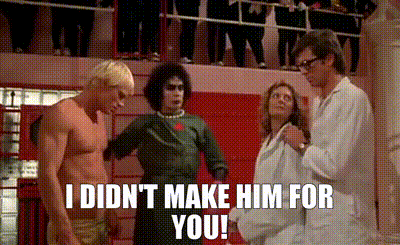
I hope any and all creators with a Belos AU aren't discouraged because some ninny on the net, who thinks they're the arbiter of social justice, got mad because they decided to have fun with a fictional character.
Fandom is not activism.
Just chill and let people put the old man in a dress.
22 notes
·
View notes
Text
GGardengirl's Guide to Choosing Perspective & Tense When Writing Fiction
because for some reason, i felt like writing an essay. (word count: 1974)
───── ⋆⋅☆⋅⋆ ─────
First Person: Give Me a Reason, Pretty Please
I don’t think I have written a single thing in first person since I was in middle school, but that is because I mainly write fic. First person fic is generally a turn off for most readers (me included) and I think that’s because first person is such an intimate perspective.
You, the writer, aren’t just writing about a character, you are becoming the character, so that we, the reader, can become the character too. If it is not your original work you’re writing about, then it can feel weird and out of character when we read it, because it implies an intimate knowledge the layman (laystan, if you will) doesn’t have when it comes to the source material. And even if you do know the source material inside and out, and have a serious grasp on the characters, fic readers are not likely to take a chance on it—so keep that in mind, if you’re thinking about first person for a fic. It can be done, and it can be done well, but just keep that in mind, so you know what you’re getting into!
(This ONLY applies to fic. If you’re writing an original story, I don’t think you need to have any worries about choosing first person, because they are your characters, and it is your story. You can do whatever the fuck you want with them, and no one can say it’s out of character. Now, onto my main thought about first person.)
First person reads as a real time internal monologue—these are thoughts being thought for the very first time, as something happens, not after. Because of this, it should mainly be used with present tense, unless there is a narrative reason for past tense, such as the protagonist writing the book they exist in.
Think: Percy Jackson and the Olympians—We are supposed to read the books as if Percy himself is the one who is writing them, not Rick Riordan. (It’s kind of a mixed perspective, because he does address us, the reader, which is direct address, but it’s still first person. The audience is only really referred to as an aside.)
We know this, because Percy straight up tells us it’s a book in the second sentence of The Lightning Thief:
“If you're reading this because you think you might be [a half-blood], my advice is: close this book right now.”
Percy is writing down his story, so that future demigods can learn from his experience. Everything that happens in PJO has technically already happened. Future Percy is telling us how Past Percy felt in those moments, while also having the gift of hindsight, and being able to know what is important and what’s not. (One could argue that this would make it present tense, but Present Percy isn’t telling us what’s happening in the current moment. The story is still set in the past.)
It can feel weird to read something in past tense when the narrative doesn’t call for it, because it makes me wonder: who is the protagonist narrating for? If the story isn’t happening in the moment, are they just sitting somewhere, going through their past beat by beat in their mind?
“I did [BLANK],” “I thought [BLANK],” —why are they rehashing their own thoughts? And why are we, the reader, being told their past thoughts? Give us a reason!
This is just my personal opinion—there doesn’t technically need to be an in-universe reason for first person being past tense. There’s no hard and fast rule. But I find it distracting to read, and I think it’s something to be aware of—the last thing you want as a writer is for your reader to be stuck on storytelling logistics, and not the actual story.
───── ⋆⋅☆⋅⋆ ─────
Third Person: Flexible as Hell
Third person is a lot more malleable. It can be past or present, but it’s still good to think through your choice of tense and whether or not it should be omniscient or limited. You want to choose something that helps serve the story, and doesn’t hinder it.
Past tense omniscient makes it clear right off the bat that the story being told is a work of fiction. It’s very storybook-esque; very Once upon a time, in a land far, far away, and all that. You don’t need an explicit narrator to make this work, but this is where an explicit narrator works the best—think: The Book Thief, and how it’s narrated by Death. (Once again, one could argue this is technically first person, but since Death isn't actually in the story, he's just telling it, it is seen as third person.)
It works similar to Percy Jackson—everything we are being told has already happened, and the narrator is telling us what happened for a reason. There is a purpose in this specific story being told—we want to read on, so we can find that purpose.
Present tense omniscient feels more like a movie/live action. We, the reader, are watching the events unfold. These things are happening now, and we are witnessing it. And, like a movie, we see a fuller version of events, because we aren’t only seeing through the eyes of one person. We are watching from a third party camera; a bird’s eye view—not straight through a character’s eyes. If you want your story to feel like a movie, this is probably the way to go.
Limited and limited omniscient POV’s work in the same way. Both focus on the direct view of a protagonist; we see what they see—limited omniscience just means you add more characters to the mix. This is typically what I choose to write in, but I oscillate frequently between past and present tense with different stories, sometimes with no rhyme or reason. If it’s a book I’m writing fic for, I tend to use whatever tense the book was written in, but otherwise, it’s just based on vibes.
───── ⋆⋅☆⋅⋆ ─────
Second Person: Criminally Underutilized, Terminally Misunderstood
Second person is…complicated. Which is understandable—it can be weird to read, and tricky to write. I understand why people tend to write second person off, but I think that’s a huge loss for them. Because when second person works, it fucking works.
Second person works best in the present tense. I think of it like there’s an omniscient overlord who’s describing your—the protagonist’s—life in real time, as it actually happens. Past tense feels weird because why is the overlord telling you what you did? You already did it—you should know.
SIDENOTE: (spoilers for Harrow the Ninth)
This is the exception to the previous statement. Second person past tense can work, but only if the story is lying to you and is secretly first person direct address.
It works when I, a secondary protagonist, am narrating what happened to you, the main protagonist, while I was hidden in your body like a parasite after you lobotomized yourself in the name of love, and you need some clarification of events after the fact.
This, and only this, is when it works.
(Please read The Locked Tomb series. I’m begging you.)
BACK TO THE POINT:
You can write in second person no matter what the story is about, but I think the real beauty in second person comes through when it’s being used for a reason. I’ve found that it works best in character explorations, and stories where the main character has complicated feelings surrounding their identity. Second person detaches you from the world; it adds a degree of separation from the self that you can’t get with any other perspective.
For example: there’s a wonderful jackieshauna fic by britishngay on AO3, called memento mori, that’s set in Ancient Rome. The entire story is set in second person, and while reading it, I realized that it couldn’t be written any other way and still work the way it was meant to.
(Spoilers for the entire fic—feel free to come back, but it's still worth reading even knowing what I'm about to say)
In memento mori, Shauna is a former butcher whose home is destroyed and is taken to Rome. In Rome, she’s forced to be a gladiator, and to go by the name of “Butcher.”
Shauna is robbed of her identity as “Shauna.” She keeps her name as a secret just for herself, because it’s the only thing she has that’s still hers—the only thing that has yet to be stolen. She takes on the persona of “Butcher.”
“‘Far from home, it’s the Butcher of Gaul!’ The announcer yells and the gate starts to rise.
The anxiety in your gut reaches an all-time high before dropping to nothing, you detach yourself from you, the girl from the woman, the rebel to the gladiator, Shauna from the butcher.”
Butcher is violent, ruthless; an amalgamation of the audience’s desires. But she can’t be anything other than Butcher, because Shauna died when her home did.
“‘Butcher?’ [Jackie] asks, tentative and for a second you forgot that that’s how she knows you, that that’s your name, your identity here.
It’s Shauna, my name is Shauna. You almost say but it gets quelled by your head. Nothing else, nothing more.”
It’s only as her relationship with Jackie grows, and she feels like she can open up to her, that she tells Jackie her real name, and then eventually Van. By the end of the story, she’s reclaimed her identity as Shauna all together.
“‘My name is Shauna.’ You tell [Van], in case you don’t make it. She’s probably your closest friend here, and you want someone else to say it, so you can hear it one more time before you go out there, in case."
"It’s nice to hear it. You’re enjoying hearing it said again, by people you trust.”
The story works the way it does, and has the impact it does because of the perspective it’s in. There is no other way it could work.
Third person wouldn’t work: Shauna would have to be referred to by name—but the narrative can’t refer to her as Shauna, because she isn’t Shauna, she’s Butcher. But she’s not entirely Butcher, because that would mean she’d completely erased her identity as Shauna.
First person wouldn’t work either. It would solve the problem of how to refer to Shauna, but it wouldn’t serve the narrative—it wouldn’t show the disconnect she has when it comes to who she is and the things she is doing. First person is far too personal, too intimate, and she has walls up for everyone around her, even herself. Shauna can’t invite an audience into her internal monologue when she doesn’t even let herself into it.
Which leaves only second person. When Shauna’s real name is mentioned, when we see Shauna call herself “Shauna,” or her friends call her “Shauna,” it feels important. It’s important, because it’s only ever mentioned those few times—only 34 times is the word “Shauna” written. “Butcher” is written 81 times.
Writing from a second person perspective gets me into a character’s head more than any other perspective. It plays a weird trick on my brain, where I start to feel like I am the “you” I’m writing about. There is something about how matter of fact it feels to write something like, “You walk down the street. You feel broken inside,” that makes me go: “Huh. I guess I’m walking down the street and feel broken inside.” Shit makes me feel weird, but I love it.
───── ⋆⋅☆⋅⋆ ─────
No matter what perspective or tense you choose to use, remember this: writing is fun! It is meant to be fun! Don't torture yourself with this stuff if it makes writing not fun—talking about technical things and writing strategies is just how writing is fun for me.
Happy writing!
xoxo, lulu ❤︎
(TLDR: first person past tense needs a reason, third person is a jack of all trades, and second person is kinda cool, actually.)
#it's the first week of the semester and this is what i did with today#whatever i had fun#essay#first person pov#second person pov#third person pov#past tense#present tense#narrative#point of view#writers on tumblr#creative writing#fanfiction#fic writing#fiction#percy jackon and the olympians#the book thief#jackieshauna fic
12 notes
·
View notes
Note
Re, this anon: https://olderthannetfic.tumblr.com/post/719669829313953792
Yeah, well... that's the point of a bunch of internet activists: they throw the stone and hide the hand, screeching that, if you're doubting their innocence, you're an imperialist racist who should never be allowed on the internet.
Stitch, the person they're picking up a lot of their schlock from, is a master in this: they attack people, and the moment those who got attacked ask what they've done that's wrong or ask to have a one-on-one conversation with them, they shut everything down, screenshot whatever they received, block the person, and then go on Twitter whining about being a victim of racism because their words weren't listened to like the Gospel. Over and over again.
After the TOG racefaker scandal broke, I went through her blog and, just as I had expected, she too followed the same modus operandi: attack, screenshot, block, cry about being a victim of racism because people didn't let her insult them and demanded explanations about her ranting, wannabe-academic, posts.
They're not the only ones who do/did this, but these are the two examples of constant "harassment is good if I do it, but I'm the only victim and the others deserved it" cycle that come to my mind as of now.
When you're looking at End OTW Racism, you have to expect the same thing. They don't have answers, they don't want to have answers. This whole movement (horribly organized, horribly promoted, horribly everything) is nothing but a huge stroke of ego for its organizers.
You know how antis accuse others of being racist or pedophiles or whatever else because, that way, the accused cannot defend themselves? This is the same thing: if the OTW doesn't address their manifesto, then they're racist because they refuse to acknowledge it; if the OTW does address their manifesto, then they're admitting that they didn't care about racism until the moment they were called out on it and their concern regarding racism within the OTW is manufactured.
It's a win-win situation for them because, no matter how much you try, if you don't fully and absolutely agree with them, you can be branded as racist.
If you scroll through the End OTW Racism tag on Twitter, you'll see plenty of people (and especially the organizers), tweet stuff in the same vein as "I went to olderthannet's Tumblr and oof," not so subtly accusing all the people who raised valid concerns and asked valid questions of being racist.
I'm also not the first person who mentions this, but Stitch does seem to be heavily involved with the project, and even if they weren't, their words have been used to build the manifesto, and they amplified this crap through one of their Teen Vogue articles.
Now... not only Stitch is known for acting in bad faith, attacking creators of colors, branding them as Uncle Toms, purposefully making fun of them if they don't agree with them and sending their followers to attack and harass, but, just in April, they were being dragged because of another article they wrote, in which they compared writing fics about bad fictional characters to worshiping serial killers. Weeks before that, they were being dragged because their fanbase of antis discovered that their fics included incest, something that goes greatly against their preachings.
How big of a coincidence is it, that Stitch needed to have their image cleaned of all sins and suddenly a group of people drops a manifesto and hashtag about racism in fandom, founding a movement Stitch fully and absolutely agrees with and can rave about for days on end? A movement that offers very vague answers and plans, and those creators attack anyone who doesn't immediately agree with them, to the point that no questions can be ever asked about it?
Unless I'm shown actual evidence that Stitch isn't involved with this, nothing will convince me that End OTW Racism was launched for any reason that isn't to rehabilitate Stitch in the eyes of their chronically online audience.
--
72 notes
·
View notes
Text
let me shill you japanese columbo
Do you like Columbo? Do you like police procedurals starring grumbly, slightly eccentric ossans? Do you believe in the power of shoujo manga?! Well, do I have the show for you!
Introducing....Furuhata Ninzaburō!
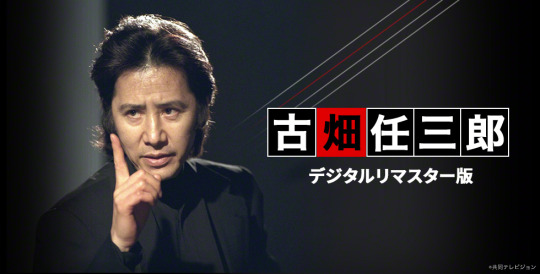
Written by genius playwright Koki Mitani and starring the extremely charismatic jidaigeki star Masakazu Tamura, Furuhata Ninzaburo is a detective drama directly inspired by Columbo (not to be confused with...Shinano no Columbo, which yes, exists). Its got the murders, its got the mystery, its got an unreasonably good theme song, and there's middle aged man with the mannerisms you love to see. The formula usually goes as follows:
Furuhata-san stands in the dark void, talking about riding bicycles or something or another to setup the theme of the story.
You see the baddie do the murder and try to cover it up. Yesiree, you see the murder-- because the fun comes from watching it all unravel!
Furuhata-san appears (possibly struggling with a vending machine, or bicycling with some half-price daikon) and catches a whiff of something funny ahead of time.
Cue the game of psychological cat-n-mouse as Furuhata-san slowly deconstructs the whole thing.
Furuhata-san looks directly into the camera like it's the office to ask the audience what the final piece of the mystery is (this is briefly addressed)
The killer spirals ace attorney style as the audience screams GOT THE BITCH! and Furuhata-san escorts them off screen to purgatory... or, you know, prison.
Yup, it's pretty standard fair detective drama stuff, but the writer Mitani is able to construct some seriously compelling, twisty mysteries that keep you on the edge of your seat. By the end of first season, the direction finds its style and you'll get plenty of jaw-dropping musical cues and camera cuts that make you feel like you're full immersed in some deluxe, spicy juicy awesome mystery fiction action!
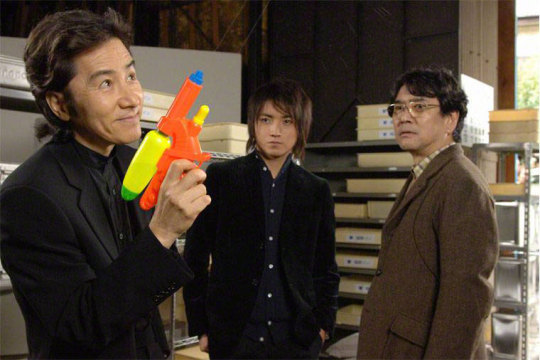
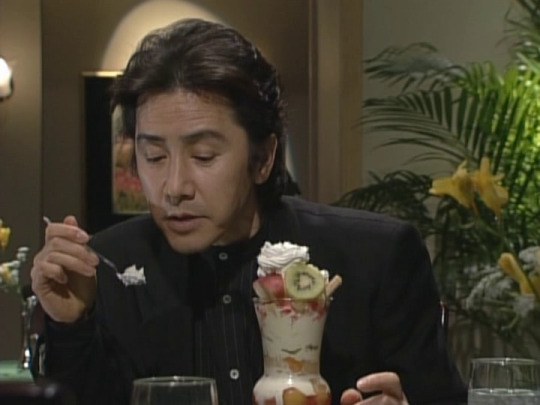


Okay... but who is the man of the hour? A good mystery needs a good detective, and there is hardly anyone as wonderful to watch as the black-clad oyajisan.
Tamura aces the role of Furuhata. It's just too good. As he's based off of Columbo he's of course a disarmingly scrungly genius with terrible posture and a grumbling-mumbling way or speaking, but he was plenty of other traits to set him apart. He's a fan of shoujo manga; he's an excellent chef but only knows how to prepare three mismatched dishes; he loves konbinis but is cursed by vending machines; he's terrible at baseball and is totally unsportmanlike; he is often seen on his beloved bike CELINE (since he was in the area anyhow)... I could go on, but the character is well realized and so fun to watch. His head tilts, forehead taps, and drawn out ええと。。。are perfectly captured, and all do a great job at annoying his victims.
A stand out trait of Columbo is his unique relationship to the culprits; he's described as being very buddy-buddy or even respectful, using his friendly ho-hum manner to weedle his way to the truth. Furuhata-san is similar, but more... salty? Bitchy? The man frequently makes underhanded remarks towards the culprit or acts offensively relaxed until he find a contradiction in their words, in which he will then pursue to the ends of the earth. It gives a kind of "c'mon, can't you do better?" attitude reminiscent of a disappointed teacher.
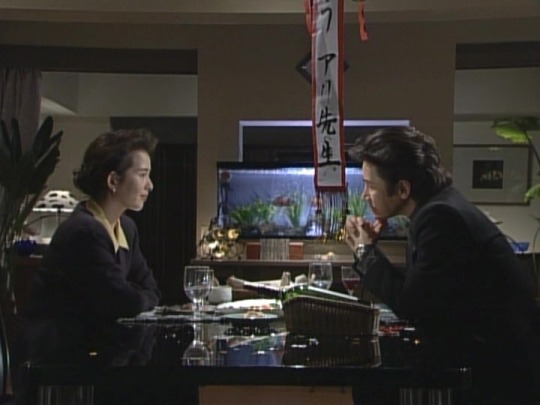
But even with all his sass (which he has in spades), Furuhata-san will always sit down with the killer and offer a smile and a bit of light conversation before the credits roll. The killers are usually afforded a bit of dignity. Most famously a radio show host tells the detective "the funniest joke there ever was"-- but as a small revenge, she refuses to tell him the punchline. Credits roll, theme plays, it's just another day on the job.
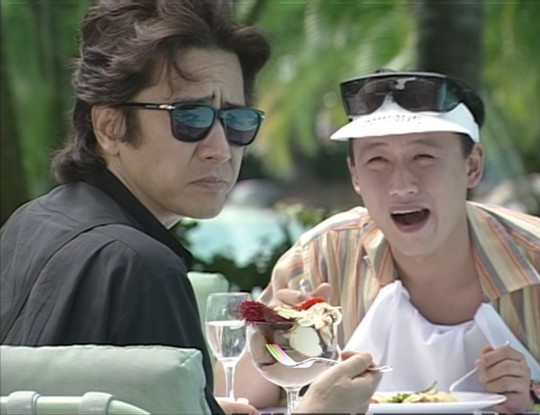
Oh, there's also Imaizumi. Imaizumi is a big dummy and always falls for the red herrings the killers leave behind. Because of this, Furuhata-san is relentlessly mean to him and slaps him on the forehead as punishment. He forces the guy to do menial tasks and be victim to his many tests. Imaizumi, however, is just happy to be here. His special skills include knitting, flower arrangement, not reading the room, and having hemorrhoids.
Okay, now have some Furuhata-san crying and reading shoujo manga.
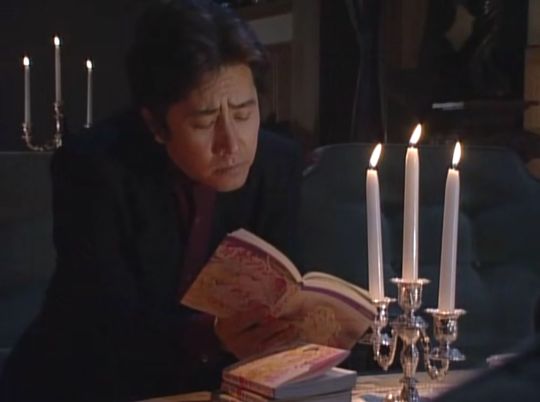
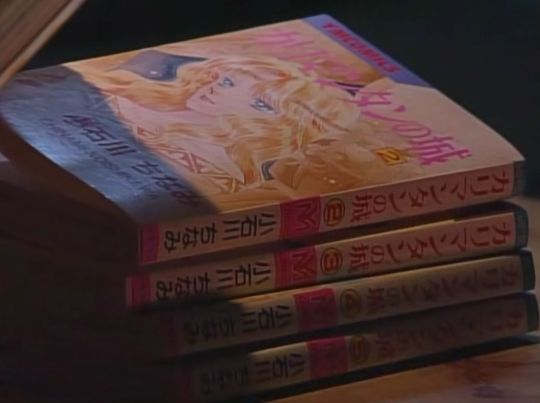
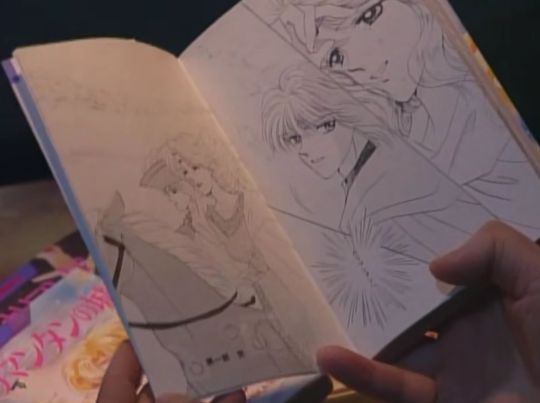
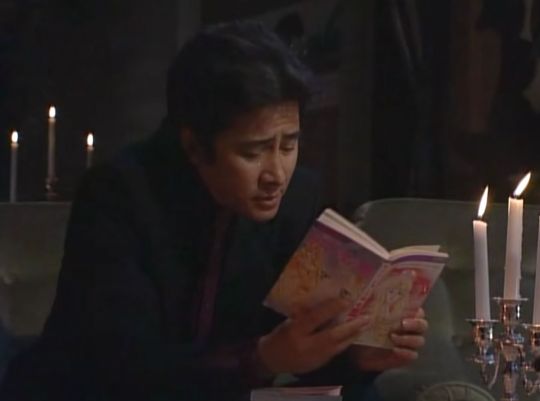
Truly the guy of all time.
You're probably totally in love with this show because I've described it so beautifully, right? Right? So you wanna watch it, riiiiight? Well lucky for you it's all totally subbed on internet archive!
Watch this awesome show ENGLISH SUBBED and FOR FREE you won't regret it! This link is so full of oyajisans! Please! Join me in Japanese crime fiction hell!
(Personally speaking, the first episode pilot thingy is a bit slow and does not represent the rest of the show very well, I would suggest skipping to the second episode "The Kabuki Murder" to get a real taste and then maybe return to the previous one later. Just my thoughts!)
Also, there was a really awesome remix of the main theme made for DDR. Here's that, but with Haruka Amami from the idolm@ster dancing over it.
Ah yes.... I have spilled my love... I suppose I should go now. Please enjoy this wonderful show, and remember: Don't you ever fuck up ever or else Furuhata-san WILL get you and you WILL go to super hell! Bye!
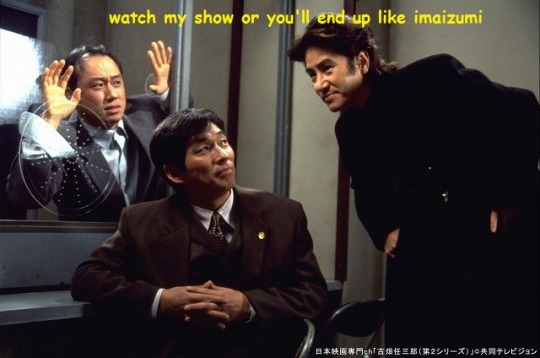
#chip talks#columbo#peter falk#ninzaburo furuhata#Masakazu Tamura#crime fiction#detective fiction#police procedural#japanese tv show#please watch this im begging you#its so enaging#i will admit i think its better than columbo#like the cases are more interesting to watch#i still love you peter falk#furuhata you sassy bitch tho#radio episode made my jaw drop actually#PEAK#or dare i say#PEAM
13 notes
·
View notes
Note
Since you've written so many essays about nuanced monsters, can you give advice on how humanize a monster while keeping the fear-factor?
My re-imagined versions of Strickler and Nomura (named Carter and Nakamura to keep the trend of book and show characters having different last names) are supposed to be more gross and horrifying than their show counterparts, but still with enough humanity in them so the audience can sympathize.
So, one of the dark truths about humanity is that while we can be taught that all humans are complicated feeling creatures like ourselves, it's very hard to truly understand that fact. It takes at least eighteen years of developing the brain to even be able to grasp that concept on a case by case basis, and there's an argument to be made that it's impossible for us to truly fathom that EVERY human on the planet is as complex and sensitive as we are. It's why we curse out people when they cut us off in traffic instead of thinking, "Man, maybe they're just nervous and late for work and didn't see me in their blind spot." If we don't have an explicit reason to think of other humans as human, we treat them as an enemy outgroup by default.
In regards to fiction, this manifests by audiences generally not caring when characters die if they weren't sufficiently humanized for us. A lot of comedy operates on this principle - there's the old adage that "tragedy is when I stub my toe, comedy is when someone else falls down a manhole and dies," i.e. the difference between whether we find something funny or tragic depends on whether we see ourselves in the person who's experiencing misfortune.
Horror stories work with this in mind too. If you want to give people a "fun" thrill, you make sure not to humanize the victim of your killer/monster - that way you're still scaring people on a shallow, human level, but not so deeply that they're truly emotionally affected by it. They're entertained in a cathartic way - scared, but safely disconnected from the subject so they can also enjoy it. Lots of horror stories work with this making up the bulk of their scares - i.e. disposable, one-dimensional victims falling prey to whatever horrors the writer concocts.
If you want to hit your audience deeper, though, you have to humanize the victim - put someone we like and relate to in peril and it hits much harder. That's what shifts the horror into the truly effective, and it's often something most horror stories don't do until the second act at the earliest for exactly that reason. It ups the stakes.
So, to finally address your question: you can have a sympathetic monster do all sorts of rancid shit so long as their victims are people we don't have a reason to care much about - i.e. shallow, one-dimensional bit characters. While on a moral level we should view that as just as evil as harming the characters we do care about, the simple quirk of humanity's limited and conditional capacity for empathy means that most people will not find it hard to sympathize with your monsters so long as they're only eating nameless background extras or total assholes.
I mean, if you get popular there WILL be people on tumblr who argue that anyone who likes your monsters is guilty of war crimes and fascism, but there will also be people who say your monsters never did anything wrong and it's actually the heroes who are fascist war criminals for opposing them, so it evens out in the end.
16 notes
·
View notes
Text
FICTIONAL CHARACTER ASK: JANINE MELNITZ
Asked by anonimus
@thereisnoblogonly-zuul
@professorlehnsherr-almashy @thealmightyemprex @goodanswerfoxmonster @the-blue-fairie @princesssarisa @gravedangerahead @parxsisburning @softlytowardthesun @themousefromfantasyland @filmcityworld1 @lord-antihero @lioness--hart
@budcortfancam @bixiebeet @spengnitzed @angelixgutz @stantzed @janeb984 @amalthea9
Favorite Thing About Them: Let's face it, besides Lois Maxwell's portrayal of Miss Moneypenny in the James Bond film series, there weren't really other examples of desk secretaries so well developed as Janine Melnitz. It is a hard job, and vital to keep government institutions and companies organized, but like the also hard work of being a howsewife, it is often overlooked because is a job associated with women that writers tend to think it won't be interesting to audiences as " the stories of man of action going into a battlefield or other dangerous kind of adventure" that they often choose to focus on. So to have this simple working class lady being portrayed with charisma, as we empathize with the boredom, excitement, confidence, anger, stress and fear that she shows as she navigates trough her job, acting as the human element that helps to keep us grounded in this fantastic story about scientists hunting ghosts in New York City, is marvelous to watch. And she is also shown to be able to adapt and become a competent Ghostbuster in her own right, even leading a back up team while being someone who, like Winston Zeddemore, didn't got access to an Ivy League University Doctorate, showing that there are other forms of being inteligent besides having a golden framed diploma, like conecting with the general public and providing emotional support for friends who need it.
Least Favorite Thing About Them: The fact that when Ghostbusters 2 went to take inspiration from the cartoon The Real Ghostbusters, it made the mistake of only getting inspiration from the character design in the messy later seasons, ignoring the idea of her acting as the fifth Ghostbuster presented by the first two seasons and instead making her have a sexual escapade with Louis Tully out of nowhere to boost his confidence so Louis could be the new fifth Ghostbuster. The writers of the second movie, wich was the same team as the first one, had the template to make progress in making a urban fantasy adventure comedy story where man and woman worked together as a team to save the day without seeing anything weird about it, and didn't tooked any advantage of it.
Three Things I Have In Common With Them:
*I have short hair and wear glasses;
*I often use sarcasm as a mechanism to cope with problems;
*I also work behind a desk with a computer, telephone, pencil and paper;
Three Things I Don’t Have In Common With Them:
*I'm not an american from New York City;
*I'm not a red head;
*I wouldn't have the courage to fight against ghosts and monsters that she has;
Favorite line:
From the July 1983 Script Draft:
"The phones? I wouldn't say the calls are pouring in, Dr. Venkman."
"Good night, Egon."
"Is it alright if I watch?"
"Thank you."
From the October 1983 Script Draft:
"Who do you think you're talking to, Mister? Do I look like a child? You can't come in here without some kind of warrant or writ or something."
"It's a sign, all right... "Going out Of Business."
"I want you to have this."
"It's a souvenir from the 1964 World's Fair at Flushing Meadow. It's my lucky coin."
"Keep it anyway. I have another one at home."
From the 1984 movie:
"You're very handy. I can tell. I bet you like to read a lot, too."
"Oh, that's very fascinating to me. I read a lot myself. Some people think I'm too intellectual, but I think it's a fabulous way to spend your spare time. I also play racquetball. Do you have any hobbies?"
"Hello, Ghostbusters. Yes, of course they're serious. [she paused and sat back down] You do? You have? No kidding. Uh-huh. Well, just, uh, just give me the address. Yes, of course. Oh, they'll be totally discreet. Thank you."
"We got one!"
"Do you believe in UFOs, astral projections, mental telepathy, ESP, clairvoyance, spirit photography, telekinetic movement, full trans-mediums, the Loch Ness monster and the theory of Atlantis?"
"I've quit better jobs than this."
"Ghostbusters! What do you want!?"
"You are so kind to take care of that man. You know, you're a real humanitarian."
From the novelization of the 1984 movie:
"Would I kid you?... Well, the soonest we could possibly get back to you would be a week from Friday... I'm sorry, but we're completely booked until then... Uh huh... All I can suggest is that you stay out of your house until we can get to you.... Well, in that case. I'd be not to provoke it. You're welcome."
"Egon, there's something very strange about that man. I'm very psychic usually, and right now I have this teerible feeling that something awful is going to happen to you. I'm afrayed you're going to die."
"That's so romantic. "
"You're sweet, Egon."
brOTP: Peter Venkman, Ray Stantz, Winston Zeddemore, Dana Barrett, Tiyah Clarke, Louis Tully, Kylie Griffin, Melanie Ortiz, Louise, Irena Cortez, Bryan Welsh, Ilyssa Selwin, Walter Peck.
OTP: Egon Spengler.
nOTP: Ron Alexander.
Random Headcanon: Her maternal family is of german-irish, lutheran and catholic background, while her paternal family is of ucranian, polish and georgian jewish background. She always took part in traditions of both sides of her family, but has more strong identification with the jewish side.
Unpopular Opinion: I understand the idea of the Real Ghostbusters cartoon series episode Janine, You Changed being an attempt to criticize the executives that wanted to force Janine into what they deemed conventional patterns of femininity by inserting the plot of an evil fae that prays on insecurities manipulating Janine after she feels insecure about her appearance, but I think that is still out of character because when it camed to her physical appearance, Janine never seemed likely to feel insecure about it, but take pride in it. If a writer really wanted to explore some insecurity in her in a way that felt organic, it would make more sense to explore her insecurity due to the fact that she camed from a working class background and didn't have access to a college and university doctorate like Peter, Ray and Egon because of lack of money or family connections and because the universities criteria to accept new students is arbitrary and elitist, but Winston, who also shares a working class background, and the other Ghostbusters would assure her that just because she isn't a former Ivy League graduate, doesn't mean she is less inteligent or capable to understand the work of tracking and studying the supernatural.
Songs I Associate With Them:
Elusive Butterfly
undefined
youtube
If
undefined
youtube
Andante, Andante
undefined
youtube
Somebody to love
undefined
youtube
You Are the Sunshine of My Life
undefined
youtube
Stay
undefined
youtube
Favorite Picture of Them:
Annie Potts in the 1984 movie
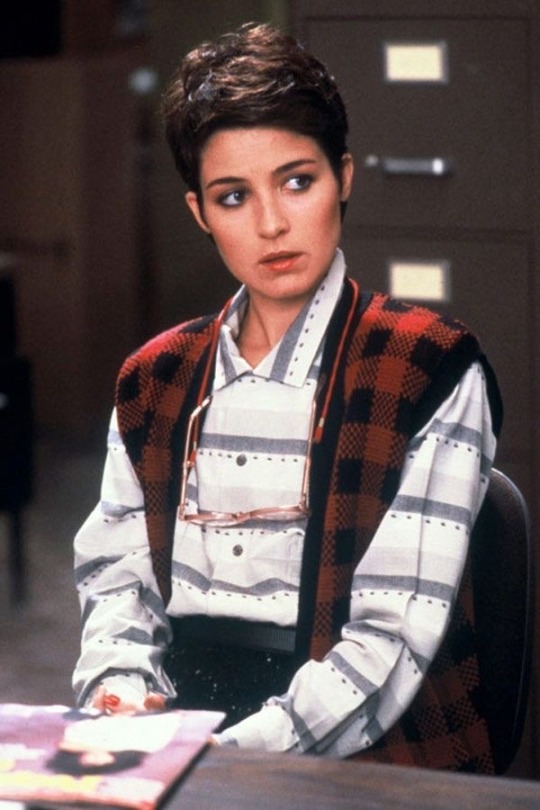
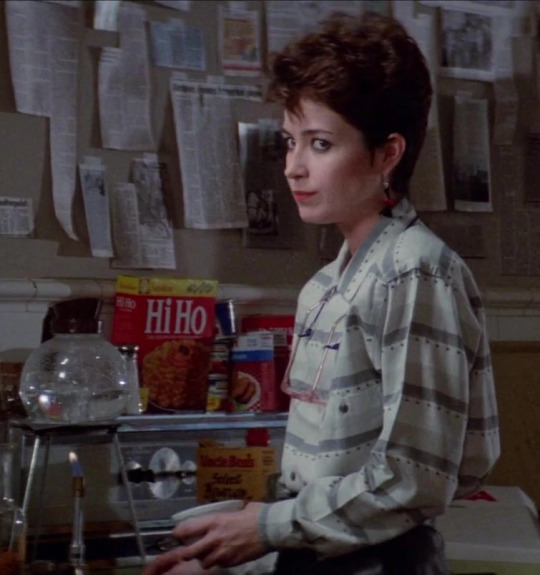

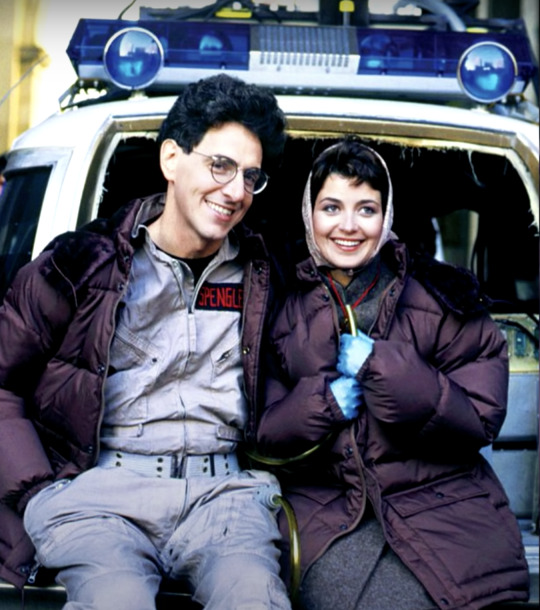
In the original two seasons of the Real Ghostbusters animated series
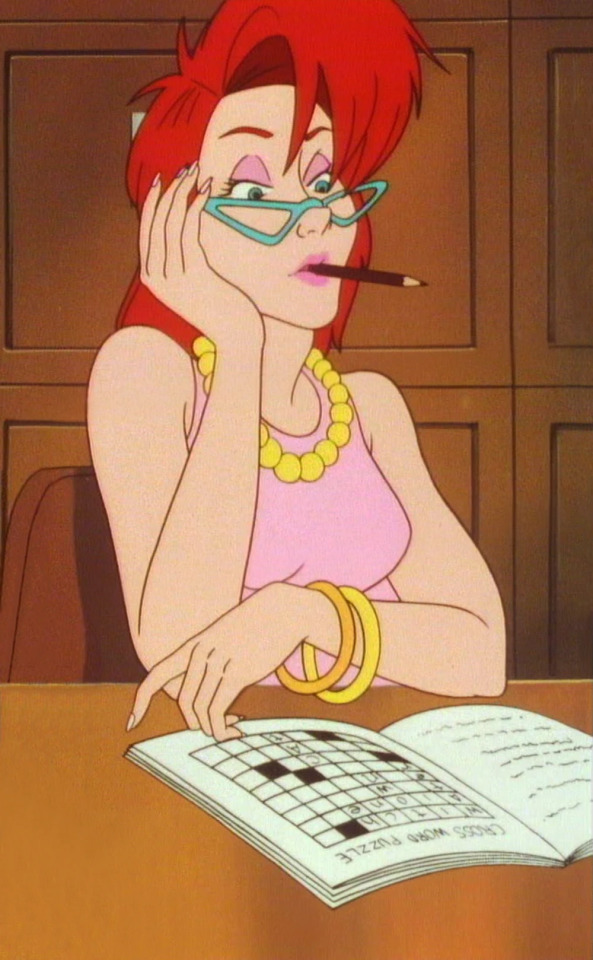
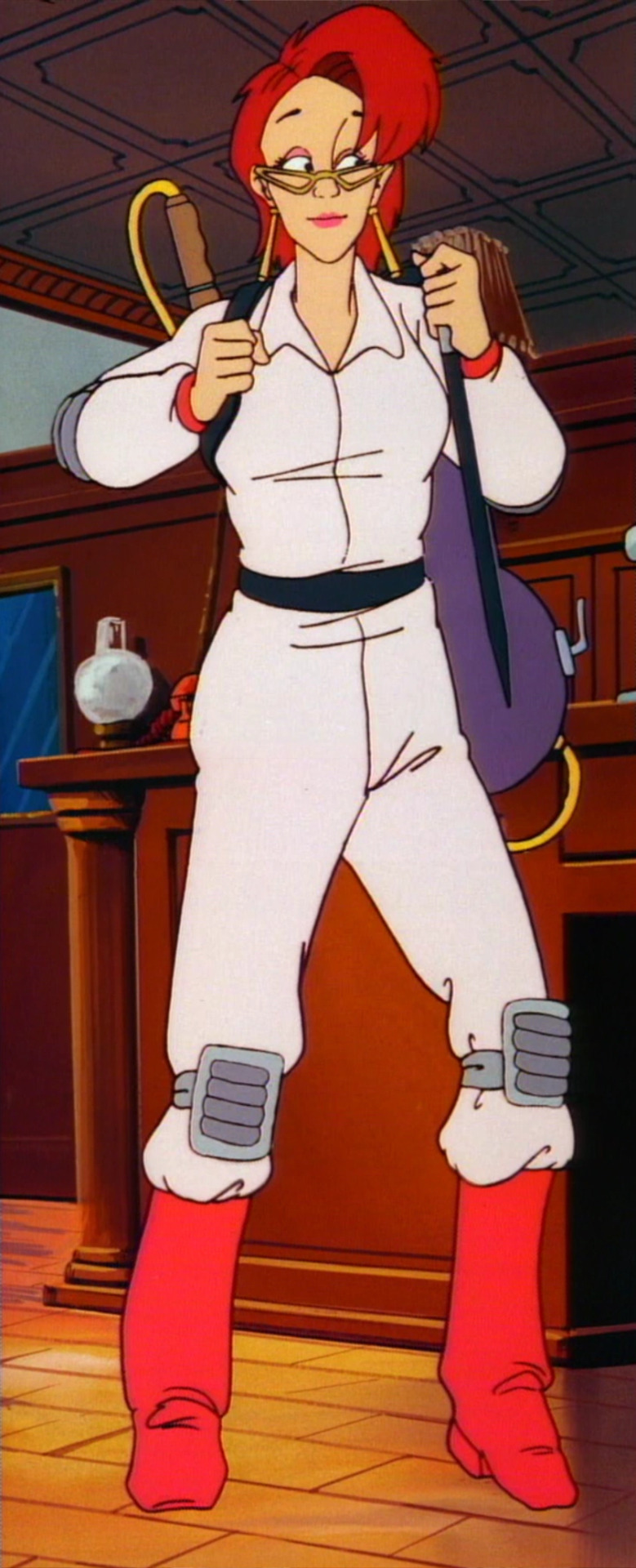
In the IDW licensed comics
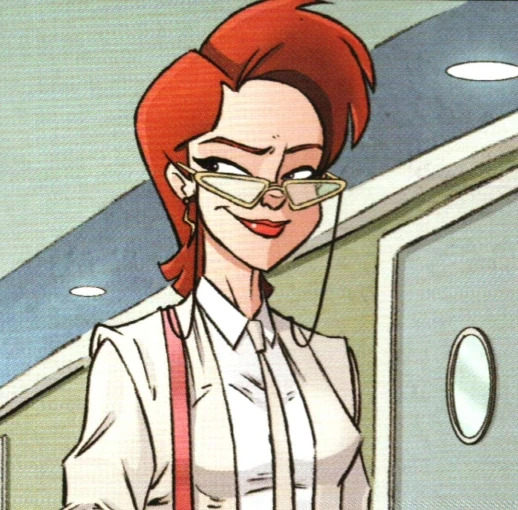
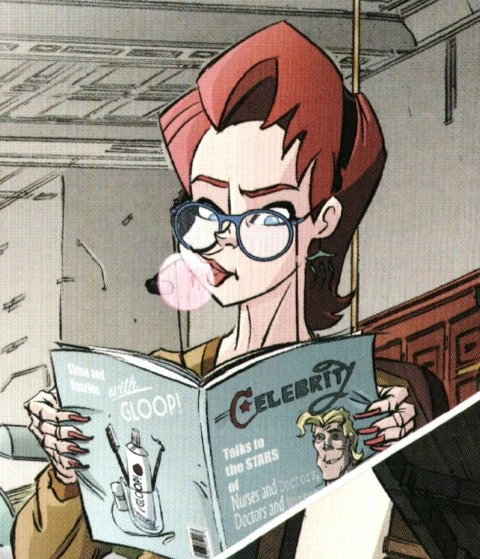
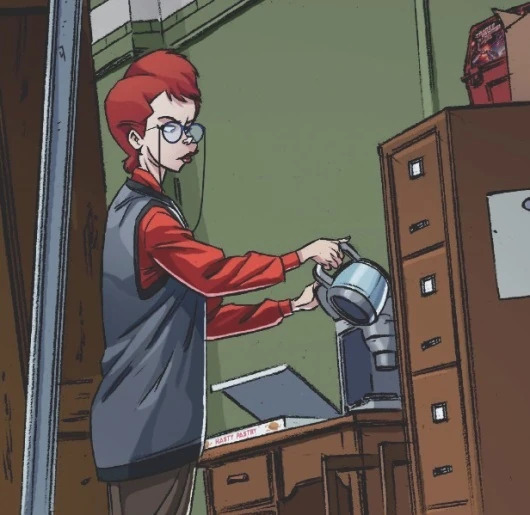
#fictional character ask#character ask meme#fandom musings#ghostbusters 1984#the real ghostbusters#idw ghostbusters#janine melnitz#annie potts#Youtube
13 notes
·
View notes
Note
Tbh I think a lot casual viewers / non book fans are probably going to not continue the show after s2 unless it diverges quite drastically on louis's storyline? iwtv is very bleak and I genuinely think they underestimated how much show viewers ended up hating lestat after s1 (and they may end up in a similar situation with armand in s2) and then you're asking the audience to watch an entire season of this guy's whole backstory. plus you're killing off one of the two likable characters by the end of s2 and shifting louis into more a side character.
a big red flag to me was the lady who hosts the podcast who doesn't have a book background saying a lot of the same stuff as show-only people. like she clearly does not like lestat or loustat at all lmao and its literally her job to promote the show.
First, I want to address the "shifting louis into more a side character" because no I don't agree with that. Contrary to fans believe, Hollywood-standard wise (from the number of episodes they are in, how integral their characters are to the story), both Jacob and Sam have been considered as lead actors/cast of IWTV. You can see industry news outlets calling them both as such. But because IWTV is about Louis' past specifically and AMC knew IWTV still has some hope in Emmys even though it's small, they put them in different categories to not split the votes between them (they even only submit one actor in each category for it). So, look at what we have now, Louis is the narrator yet we still get Lestat in all episodes, and he's leading the NOLA narrative forward together with Louis despite not existing in the Dubai narrative. I bet we'll still get Lestat in most, if not all episodes, in S2, because Rolin has said many many times, the show is about both of them. And I expect they'll do the same in TVL season(s); Lestat is telling the story while Louis is leading whatever will be going on in the modern time. (No, i don't believe they'll make Louis stuck on a couch the whole season to listen to Lestat's story even though it sounds tasty. He'd definitely have a way to know what Lestat's saying, but I don't see anything good writing-wise from sticking your well-developed character in one place for such a long time)
About whether the audience will be willing to listen to Lestat's past, I'll see how S2 goes first before judging that. A lot of people don't like him, but there are a lot of them who are like, "I will miss him if he dies, he's an interesting character".
And IWTV is a niche show, its genre is gothic horror/romance. Who the hell is doing gothic romance for a series in this decade? (Hannibal doesn't count, it's not gothic and still about will/won't they). Like, what AMC is doing with IWTV now is extremely daring. And with a niche show, it's always the same: you can't please everyone. There will always be part of the general audience who will leave because either it's simply not their cup of tea or they can't stomach it. Especially now when there's this purity sentiment going so strongly in general (apparently now we shouldn't ship fictional characters, every sex scene has to have a grand purpose, and you shouldn't watch any portrayal of abuse even though it's produced by the victim herself). God forbid IWTV would ever want to please those people yikes. So, IWTV won't ever get as "mainstream" as what, Succession, Ted Lasso, Better Call Saul. But IWTV would still appeal to people who appreciate good writing, people who are "idc how bad the characters are as long as they're exciting!", and people who really love horror (not that "comfort horror" BS) - there's this review of IWTV from an horror website who is like "I wish they gave us more gore and horror of vampires", oh these people would love S2.
So, tl;dr you could say it's a natural selection (hell yes Darwinism), it's inevitable. I'd rather have that audience leave than stay and ruin fans' experience by whining about the plot that won't ever satisfy them. And I'd always applaud writers who don't give a shit to what people say and stick to what they're meant to do. They slay!
EDIT: ah I forgot about this. but don't underestimate the number of old fans who will probably check the show again when the TVL season(s) come. Because no matter how big their hatred for AMC is, it will be the first time ever for TVL to be adapted on screen. First time in 38 years (yes no one considers QotD movie ever existed). That's too big a temptation!
#and this is why i suggest you look at someone's fave shows first#before reccing IWTV to them#like you know it'll be okay reccing IWTV to Hannibal or Yellowjackets fans most of the time#cos they appreciate fucked up things#moi.txt#the cases i referred here are The Bear. sex scenes in general. and the upcoming movie of Priscillia Presley#yes Priscillia is executive producer
7 notes
·
View notes
Note
Is it possible(in your opinion) to write a villainous character with free will(free will as in "You could have done things differently", not some dumb idealized version of free will as in "You could have done a 180 in 1 second") who comes across to most of the audience(even if the audience doesn't admit it) as someone who's not morally accountable for their actions? A character whose notions of right and wrong are so radically different to the average person that you reasonably could say to that character, "You couldn't have lived a more moral life with the experiences you had, therefore you didn't have the free will to be able to do better and you're not morally accountable for the things you've done"(If by "free will" you mean "You could have lived a more moral life with the experiences you had"). Would a feral child who was literally raised by wolves qualify?
Before actually responding to this I'm going to preface by saying that this will be the end of the discussion. I am not running a discourse/meta blog. This is a fic and shitposting blog with some serious mini-metas sprinkled in.
I've stepped away from discourse back in 2020 for many reasons and I think that I've been doing good at sticking to that. I'll answer asks inquiring about my opinions every now and again. But I am not interested in debating over fictional characters anymore. Not with the fandom atmosphere being the way it is. That said I do feel like this is stepping into debate territory.
On top of that it meta/debating is a time commitment. It takes me about a half-hour to an hour to reply to these asks (and asks like them) as I try to be thoughtful about my responses. And that hour is without proof reading and taking the time to present my points in an organized fashion. I just don't have the time to put into doing that. I would rather spend that hour working on fics.
All of this said, this isn't a personal attack. It's kind of just a general housekeeping thing and I'll probably add a little something like this to my pinned post or blog bio.
So to address the actual question in mind. I was kind of thinking about these asks last night and came to realize exactly why I've been having trouble answering these asks.
It's because I'm trying to discuss my opinions that operate within a framework that you set up. I don't mean this in a hostile or accusatory way. Just in a way to say that my thoughts on this are particularly unorganized because I've been trying to discuss this in a way that I don't normally, using phrases that I don't normally use.
My bottom line is that I think that Azula is a very conflicted and complex character. I think that she was raised with a skewed sense of right and wrong. I don't think that she is born evil. I think that she is the product of her environment. I think that she knows that some of her actions were wrong (the ones regarding personal relationships and fear as a tactic in those relationships) but she thinks other actions (the political and war related ones) were the right thing to do because of how she was raised. I think that everyone has some sense of right and wrong and I've always believed that people are born neither good nor evil; they're a blank slate and environment and experiences help shape a person's sense of right and wrong. Everyone has a different sense of what that is--what is right to someone is wrong to another person and that's what makes this whole argument so complicated. Azula is smart, she has her opinions but she is so young that a lot of her opinions and worldviews are still heavily influenced by people that she looks up to and the propaganda that she has been exposed to.
This whole 'free will' aspect of the argument is way too philosophical for my blog. It's a discussion of it's own and I believe that we would have to have a much longer and separate conversation about what I think free will means. A conversation that doesn't have the extra fluff of fictional characters. And this is not something that I'm interested in discussing because I don't run a philosophy blog and I don't think that anyone really wants to sit through Bella's philosophy class. I am, in fact, not a philosopher lol.
So the aforementioned are my opinions on Azula and her sense of right and wrong. Place that where you will on your no free will to all the free will spectrum. Likewise you can place that where you please on your 'Azula knows better' spectrum.
In terms of accountability I will just reiterate what I said; Azula should be held accountable but her punishment shouldn't be cruel. The other trap that I fell into was trying to justify my reason for thinking the italic statement based on your discussion of whether or not Azula has free will when that is not how I came to decide that she should be held accountable but fairly so. I think the above statement not because of I think that Azula has or doesn't have free will but because of her age and because I simply think that everyone deserves a chance to change, heal, and grow regardless of whether or not they had free will or the life experiences to make better choices. The whole point of healing and redemption is that the person, for whatever reason, made mistakes and bad choices that require growth. And growth and healing can only be done if the accountability/repercussions are fair and offer a chance to learn.
So to answer the new question; it is absolutely possible to write a realistic, multi-faceted villain. I do think that it is possible to write a realistic villain who has free will. I believe that it is possible to write any type of character.
This statement also operates under the assumption that I see Azula as evil or a villain. Which I do not. She is an antagonist for sure. She's a mean person, yes. But I don't think that she's evil. I think that Azula's character is far too black and white to be classed as evil or good. I think that most people and characters (the best written ones imo) are written in shades of grey.
Regarding the feral child statement, I kind of don't know why this was bought up. Azula isn't a feral child, she was a highly educated child living in a palace in the middle of a big city. I do not know enough about the psychology of feral children to talk about feral children. And again this requires a discussion about non-fictional people and topics and that's just not what this blog is about. Bringing this in just feels like a tactic to complicate an already very complicated discussion that is beyond the scope of the type of discussions I usually have regarding fictional characters and just on this blog in general.
TL;DR this discussion is just very complicated and has so many layers. At the end of the day I just like Azula, I see her as a confused child who could use love and healing. I have many ideas about what influences her choices and a lot of them have to do with how Fire Nation politics and her father influenced her, her need for perfection, and so on. And I feel like there are a vast many ways that a redemption/healing arc could go for her. There isn't one single right way to go about giving her a redemption arc that holds her reasonably accountable, but several right ways. Likewise there are several wrong ways. And all of it is subjective.
Those are my opinions feel free to interpret them how you will and place them wherever you feel like placing them in a discussion about free will.
And finally, to close, I do mean this in the most respectful way. And I don't intend for this to come off as condescending or harsh if it does. Mostly, I'm trying to establish what I think is a reasonable boundary on my blog. Thank you for opening up a discussion and for listening to my opinions without being judgemental. But I am going to put an end to this one now.
15 notes
·
View notes
Note
"Love stories are meant as an escape, whether to be read or written, and as someone who’s been in more than one of these relationships (both romantic and familial), fuck this mentality." Uh, go read the original Romantic novels. They weren't written to provide "healthy wholesome uwu relationships" for people who think all fiction should be didactic.
Anon, I'm going to assume that you HAVE read the "original romance novels" and can provide context? Cuz I'd honestly like to know which ones you're referencing in this. As an FYI, even the earliest work of Shakespeare was meant to be entertaining. And saying every piece of fiction out there promotes a positive outlook on life would be a farce. I'm very well aware of the variety of written works that exist in the world.
Going along the notion that you've completely missed the point from this post, it doesn't matter when you're reading romance stories, whether it's paid for or original or fanfiction, creativity is meant to be enjoyed. The thought that the main couple (or even the plot) needs to be "toxic" in order for the audience to connect or "go mad" over is BONKERS. For those of us conscious enough to recognize the trauma we've gone through, I can pretty much guarantee that we do NOT want to relive it.
I'm not saying everyone, cuz like I said in the previous post, there are some people who need to read about things that like that because they want to see the protagonists overcome the trauma. They want to see the characters survive, and that's totally fine! I don't speak for everyone.
Who I do speak for, are those of us squinting at the notion that toxicity on its own is entertaining. And normal. IT'S NOT. Brushing off negging and jumping to conclusions and stalker-like tendencies is NOT okiee and should be addressed as such. I look back on all the shoujo manga I read as a teen, and I cringe at all the times a conflict arises SOLELY due to one of the characters overhearing a conversation and RUNNING AWAY instead of simply asking their partner about it. THAT'S NOT HEALTHY.
So yes, I will continue to write my characters with the ability to talk to each other. With the ability to work through their problems, both externally and internally. To create healthy relationships based on trust and communication and love. Save the toxicity for the villains, and stop trying to pass it off as a necessity for a functioning relationship. THAT is what should be considered normal.
#psa#writing psa#swing and a miss#my inbox is open#my inbox is always open#spill the tea#toxicity is not normal#promote mature relationships#trauma#try again next time
5 notes
·
View notes
Text
not to write an essay on naruto barely a week into 2022 but like...just imagine what the naruto manga could've been like if it had stuck to the grim cynicism it had going on early in the series, the unforgiving critical takes of the shinobi system and consequently what it means to be a ninja in that sort of society, and the nuanced characterization of the land of waves arc, and to a certain extent the chuunin exams in that they are openly acknowledged by hiruzen himself to be a proxy war between prosperous villages as a way to flaunt military prowess. the kind of story it could've been instead of trying to contain it strictly within narrow shounen manga parameters and if it hadn't been hampered by increasingly bad writing/editing decisions that i suspect were largely motivated by business decisions given its popularity and following in jump and the kind of audience the magazine caters to
like...early naruto shows kishi actually has the ability to tell a pretty decent story. i have no idea if what happened later on is solely due to kishi's shortcomings as a writer or if other industry/editor factors had corrupted the story into an ultimately disappointing mess by the end, but. imagine what we could've had if it'd stuck with sobering thought-provoking conversations like this
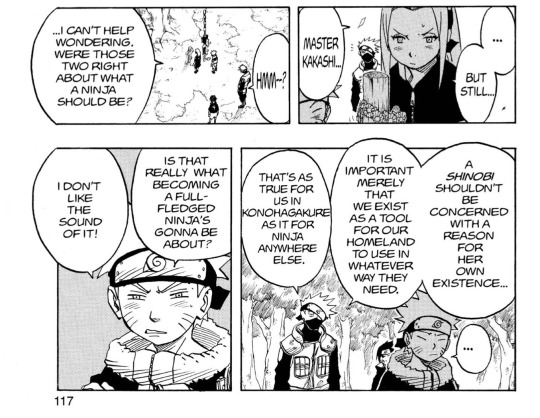
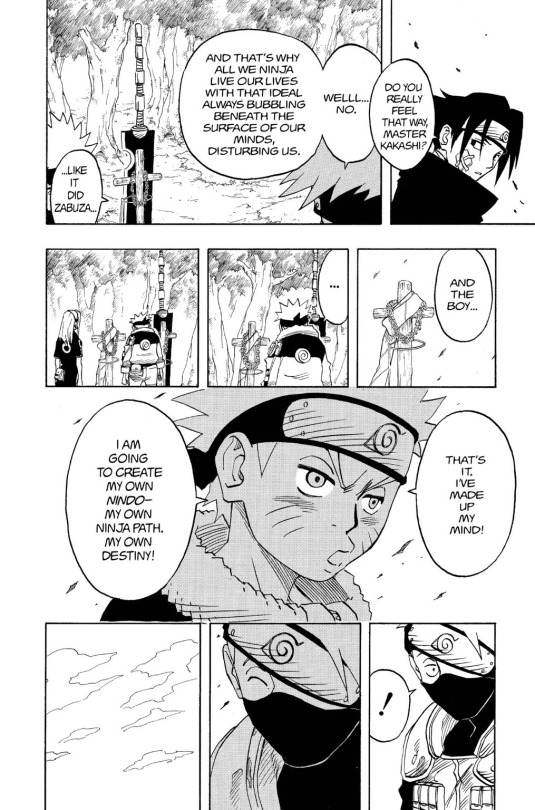
the waves arc ends on this somber realization of what the shinobi system is after naruto finishes his first big boy mission and his childlike arrogance/naivety is humbled by witnessing firsthand the sheer amount of devastation and trauma other people besides himself have had to deal with in a world that is utterly messed up in ways he couldn't even imagine. ending on this note sets up the expectation that the rest of the series will be devoted to exploring the question of what being a ninja really means and how naruto will fight to change the status quo, but...it's never really addressed again?
like there was even a big opportunity at the end of the pain arc when naruto and nagato are talking for naruto to really examine the shinobi world again and really consider what exactly he's been fighting for this whole time, but kishi does the most disappointing cop out by having naruto sidestep the question nagato is posing to him altogether and pulls out a FICTIONAL BOOK as proof of his commitment to change the world, essentially being like just trust me bro i was named after the guy in this after all and nagato is just like oh damn you're right. huh?????
since i only watched the show the first time around and read the manga this time, manga sasuke is actually so much more bearable than anime sasuke?? though i think his character motivations could've definitely been better conveyed. like.....i think i know the antihero vibe kishi was trying to go for when writing sasuke but.......he really wasn't very good at it lmao. but at least the critical questions sasuke asks are directly related to the question the early series poses at the end of the waves arc:
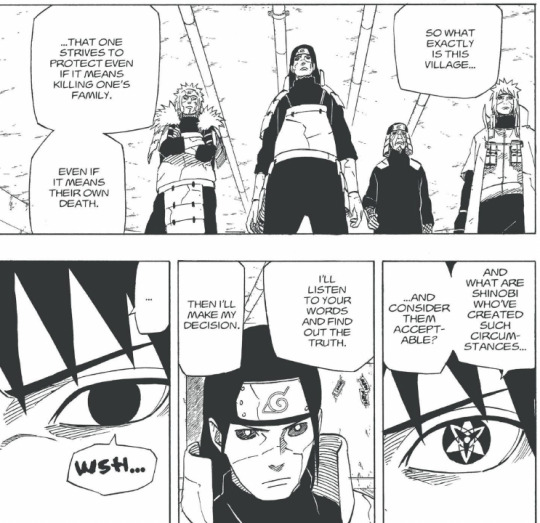
like kishi keeps doing this weird thing throughout the series where the storylines he writes inevitably end up criticizing konoha/the ninja world at large bc he literally set the world up this way on purpose when creating this series, but then he backs down when it comes to actually implicating konoha (perhaps bc such a prominent jump series can't go full on anti-establishment? 🙃). i think this is why sasuke's characterization suffers because on the one hand kishi wants you to sympathize him but at the same time wants you to think he's wrong for going against konoha despite everything he went through? and that's why it's so easy to write sasuke off as an asshole who refuses to listen to anyone bc kishi couldn't fucking make up his mind about the kind of character he wants sasuke to be and his ultimate role in the story?
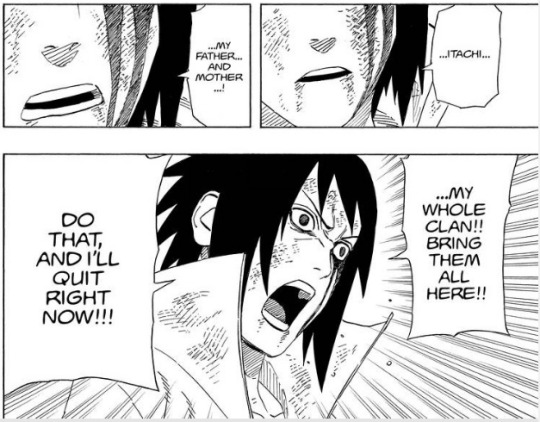
the uchiha resentment that's literally embedded in the very fabric of konoha society since its establishment, the clan essentially being relegated into a ghettoed corner of the village and systematically kept from prominent roles of power stemming from tobirama's prejudice and the clear nepotism at play with the village's leadership, the true purpose of the uchihas' role as the village police force...sasuke is one of the few characters to actually make valid points and criticisms but since kishi desperately wanted to shoehorn the yin yang theme into as much of the story as possible partway through, he depicts the naruto/konoha view as morally superior and frames sasuke as merely blindsided by hatred who must be saved from his "darkness" by naruto. it feels like kishi wanted really bad to turn this into an easy good vs evil type of situation so he could wrap it up nicely and made sasuke decide on the childishly stupid goal to kill every konoha citizen that's out of character even for him, since when he was still with orochimaru and when he first formed team taka he pointedly refused to kill anyone who had nothing to do with him. it's like...kishi didn't even try to give sasuke a fighting chance in the story lmao
which is why the final naruto vs sasuke fight that was hyped up for the series' entirety lacks any emotional gravity and is so disappointing because even before they start you know how it's gonna end and sasuke's admittance of his loss to naruto acts narratively to dismiss sasuke's grievances and justified criticisms against the state that wronged him in every possible way as a fight he cannot win
and like?? the series never even gets close to questioning the reverence every konoha shinobi has for the will of fire? like maybe it didn't necessarily start out that way with hashirama when he first co-founded the village with madara in order to steer the world towards peace, but it's never criticized how it evolved to become a form of indoctrination and way of maintaining subservience to a military dictatorship, to the point you see even shikamaru equating it to some kind of pseudo-religion?
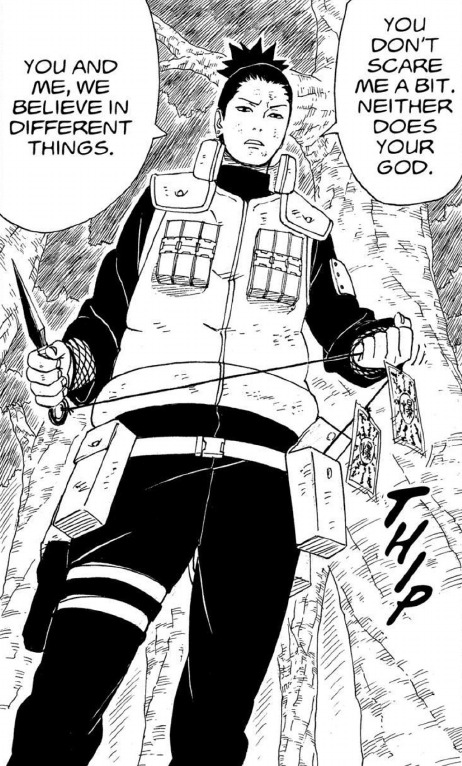
like it's held up to be this lofty code of conduct about protecting your comrades and a noble act of self-sacrifice, even your worth as a shinobi equated to how far you are willing to go to uphold this doctrine (and going against it is in many cases an act of treason). but there are so many instances in the story where the hypocrisy of this messaging shows, namely the village's collective treatment and abandonment of naruto, the uchiha massacre, the choices itachi had and what he was ultimately driven (manipulated) to do in order to maintain intra-village peace out of his loyalty to konoha (which overrode even his feelings for family and clan), the village leaving a 7? 8 year old sasuke to his own devices despite his fragile psychological state, the village ostracizing sakumo for putting his comrades above the mission and driving him to suicide...and yet there is not a single discussion about the dangers, shortcomings, and implications of this ideology, all the underhanded and atrocious things the village has swept under the rug in the name of the will of fire.
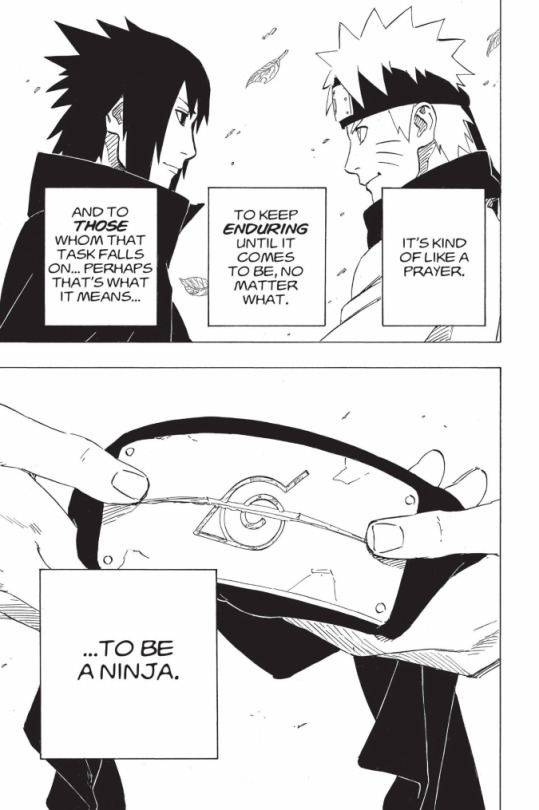
and the end of the series' answer to the question of what it means to be a ninja, to "endure," rings hollow when the last chapter shows nothing really changes, naruto continues to uphold the status quo as hokage, the five villages are i guess on friendlier terms with each other but the shinobi system is still going strong and 12 year olds are still being treated as soldiers/tools of the state once they graduate ninja school??
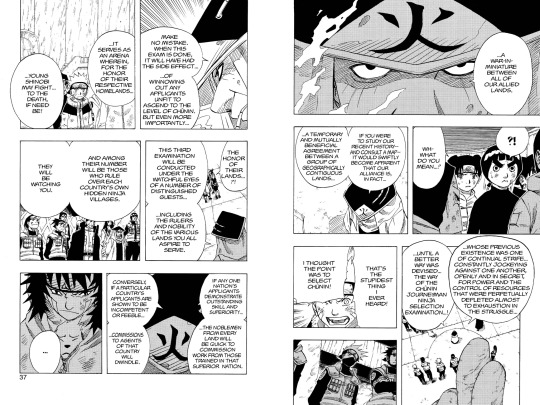
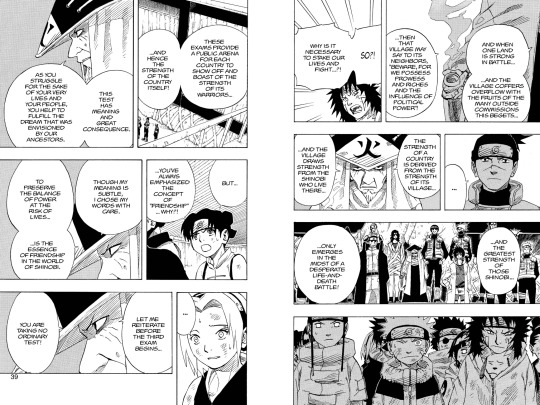
imagine if kishi had stuck with this kind of political intrigue and kept exploring the characters' roles and relationships to the society they live in and are conditioned to uphold? instead of doing whatever the hell that was in the war + kaguya arcs that destroyed any agency any naruto antagonist had by reducing the entire series and character decisions to a cheap "gotcha" since all of the shinobi world's grievances were orchestrated by some higher power who is literally an alien? like everyone was manipulated by obito who was manipulated by madara who was ultimately being manipulated by some alien moon goddess' armpit demon? is this even the same person who wrote the land of waves arc lmao
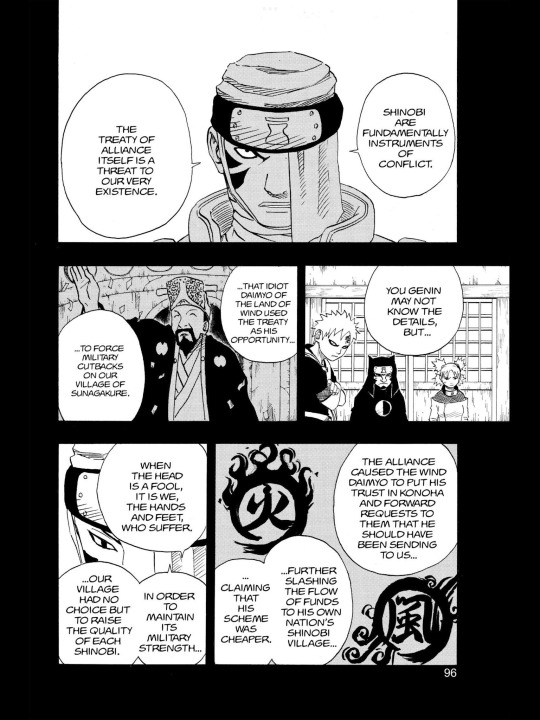
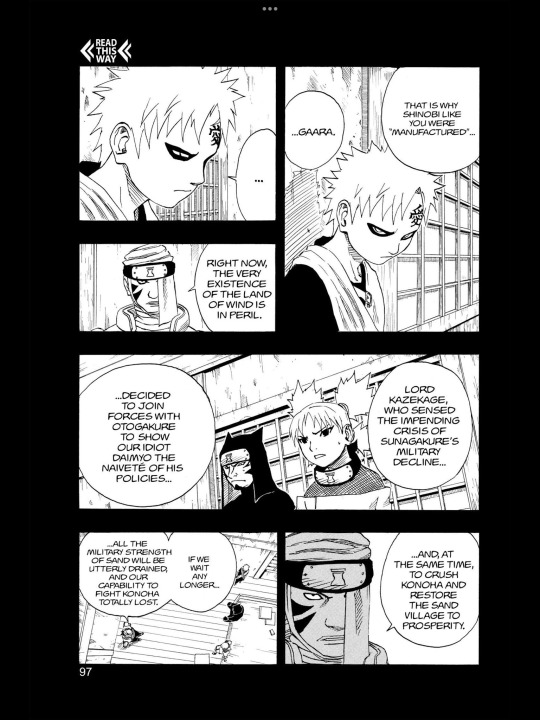
like early naruto was exploring some surprisingly complex and mature ethical, moral, and political themes for a series published in a magazine aimed at like 8-16 year old boys and perhaps that’s why the later manga is so different in tone and story direction as it gained more attention and popularity. like looking back now it’s clear kishi was already able to write like this so early in his career and despite how much i love dunking on him it makes me wonder how accurate his being a bad writer really is, or if it's more that he was prevented from writing what he wanted originally more than any personal writing failings on his part. which he has plenty of, but i wonder how many higher up decisions were made that effectively killed his original vision for this series. i mean naruto was def one of jump's biggest cash cows (and still is; just look at the fact boruto exists) and as a result they probably wanted to pander to a certain audience, effectively sacrificing a compelling story for a lucrative business decision based on what "sells" and keeps people reading without rocking the boat. like part 1 and part 2 naruto are two very different stories with different messages and maybe we'll never know the exact reasons or how much it really had to do with kishi's abilities as a writer. and yet i know the bitter sting of what could've been will eventually fade again and i'll just keep crawling back every few years because i love setting myself up for disappointment 😔
don't even get me started on how these writing shifts impacted the naruto girls...like it wasn't Great obviously but part 1 had nearly all the good character-growth moments for them and it's hard to believe the same person wrote the part 2 girls like that without some outside influence making certain decisions :/ the utter disrespect
#unfortunately i have developed basic critical thinking skills since the age of 20 and am thoroughly suffering the consequences#why hasn't naruto destroyed the shinobi-village industrial complex? like what was all the 700 chapters even for?#also what kishi did to yamato is unforgivable like what possessed him to think of the worst possible thing to do to him like that#i rewatched the anbu filler arc bc i have a pathological need to thoroughly drive in any pain i feel and i'm si ck i love yamato so much#nar#to think i'm once again losing sleep over naruto#anyway...might actually update that good fillers list i made since non-canon content is the only way i know how to heal from this
54 notes
·
View notes
Note
Help, how ok is to leave an open ending, i am planning a series, whose first story would end on an mysterious note, without showing what happened to the fate of those characters, i mean they get to the end of their own Journey, but the magical event they tried to avoid wont be shown because then the second story would jump several centuries where other characters will discover what truly happened to the characters from the first story. Note on that, second story is neither a spin off or sequel, or whatever, is literally the co tiniation of the story, strongly bounded to the first one. I have read articles on open endings, but your blog is the only place I can adress the story itself, how to make an open ending work on a story with huge timeskip?
Story with an Open Ending
First and foremost, I want to address the fact that a book that continues a story is still a sequel. Siege and Storm continued the story that was set up in Shadow and Bone. Catching Fire continued the story that was set up in The Hunger Games.
Also, if you package a story as its own separate thing, and then you write another story that takes place in a completely different time and/or location, with completely different characters, that is still very much a "spin-off" (or what we call in fiction a "companion book/story/series") even if it addresses characters and events from the previous story. An example would be Leigh Bardugo's Shadow and Bone series and its companion Six of Crows duology, which take place in the same world, referencing some of the same events and characters, but with its own individual story arc and characters.
Having said that, your story exists in a weird middle ground. It fits the definition of both a sequel and a companion series, yet it's actually neither. It sounds like what you're doing is telling half of a story, which could be a problem.
All long fiction adheres to a basic structure, which looks like this:

Since you say "the magical event they tried to avoid wont be shown," it sounds to me like the magical event is the climax, so by not showing it, your first story is structured like this:

And honestly, that's going to be a really hard sell no matter what your end goal is for this story. Readers don't want to invest in a story only to get to the end and find out there was no climax and there is no end. Readers want a complete story with a beginning, middle, and a satisfying ending. In other words, it's okay to leave the door open for the next story by setting the ball in motion for new events, but the events laid out in the current story need to be wrapped up.
Ultimately, what you need to do is reconfigure the story so that this "part one" story has its own setup, rising action, climax, falling action, and denouement. Look at what's already in the story and see if those things are there. Maybe you can tease them out a bit, then find a way to wrap up as much of the story's threads as possible while letting the hint of the impending magical event be the cliffhanger ending that leads into the next story. I think if you do this, you can probably pull it off as long as you're writing it for a small audience, such as for friends or to post on your blog or a fiction-sharing site. However, this is not a story that is likely to find success in traditional publishing.
Traditional publishers rarely commit to a series unless the author is already well established, with a solid platform and strong sales record. Otherwise, they want a book one that can stand on its own while still leaving the door open for a second book if sales warrant a sequel. They're certainly not going to take on the risk of publishing half a book. But, I think as I said in the above paragraph, there's probably a hidden complete structure in there somewhere that you can tease out to come up with a more stand alone story, while leaving the characters' exact fates somewhat open-ended and the big magical event still on the horizon. (At least as far as the reader knows...)
Good luck with your story!
•••••••••••••••••••••••••••••••••
Have a writing question? My inbox is always open!
Visit my FAQ
See my Master List of Top Posts
Go to ko-fi.com/wqa to buy me coffee or see my commissions!
64 notes
·
View notes
Note
please read the article 'How White Fandom is Colonizing "Character-Coding"' by Shafira Jordan and quit while you're ahead
Okay, so I read it and see the problem, and I’ll try to address all their points in order because I don’t wholly agree with the article. I know it’s a lot to read so I’ve put tldr; sections at the end of each :)
Misusing the Term Reinforces Negative Stereotypes for Marginalized People
The article essentially argues that labeling characters which are villainous as POC-coded is bad because they’re not morally pure and doing so "reinforces the idea that people of color are naturally dangerous and not to be trusted.”
Which is fair as you don’t want all the representation to be of ‘bad’ characters, but I also don’t believe all representative characters have to be ‘good’ either as it would be equally racist to divide good/bad in such a way. Not that I would place Loki under ‘bad’ to begin with, but arguing that characters shouldn’t be labelled as POC-coded for reasons unrelated to what’s presented in the narrative or because they did bad things is :/ even if lack of good representation is a prevalent issue in current Western and influenced media.
Ideally there should be a range of representative characters that fall into ‘good’, ‘bad’, and ‘anywhere in-between’ because variety and complexity in character types should, in theory, be treated as common practice (which can only happen with a multitude of representation!).
And a bit unrelated but... within the fictional context of Thor 1, all the Jotnar (sans Loki) are presented to the audience as ‘bad’ by default. They desperately want to get their Casket back to the point of attempting stealing it (from the ‘good’ characters), they fight the heroes and even when the gang and Thor (’good’ characters) are enjoying or going overboard with taking lives it’s inconsequential, Laufey wants to kill the opposing king (who just happens to be a ‘good’ character) and will resort to low-handed methods to do so, etc. The narrative itself is from the frame of reference of the ‘good’ and we only see warriors of Jotunheim though so we understand why it’s like this, because regardless of their race/experiences the narrative carries, even if it most definitely would be seen as racist from our real-life perspectives if the ‘monstrous’ race were presented by actual people of colour, even if it would make sense for the people on on different realms living in different environments to be different from each other, and realistic even for that to be the root of some conflict.
tldr; not using a specific label to prevent negative presentations of the characters seems a bit strange to do when the coding would be based off the text, but with limited representation available I see why it would be done, even if I still believe minority-coding is free game to expand/interpret.
Improperly Labeling a Character as “POC-coded” Suggests the Experiences of All People of Color are the Same
The article argues that labeling Loki as POC-coded “suggests that all people of color have the same experiences, when in reality, people of color come from different places, have different cultures, and have different traditions.” And while it’s true that the term doesn’t go into detail about which particular experiences (and these experiences can vary vastly due to diversity!) the appropriate measure would be to remove the umbrella term POC altogether as people of colour tend to also vary. But that’s also exactly why it’s an all-encompassing general term? It’s a way to denote anyone who isn’t “white” and has the associated cultural privilege that comes with the concept of white supremacy.
And, obviously, in the fictional setting presented, the concept of white supremacy is not prodded at, but cultural supremacy is definitely one that makes recurring appearances, right next to the parts about Asgard being a realm built on imperialism with ongoing colonial practice.
My take on this is that Loki’s narrative features a struggle with identity after finding out he’s of a different race and was being treated differently his entire life and being Jotun was presumably a part of the reasoning even if he didn’t know it. He’s basically treated as of less worth for inherently existing differently. I do believe that racism is a common-enough POC experience, but that while Loki was born with blue skin he passes/appears white which is why I don’t say that Loki is a POC, just that he has been coded/can be interpreted this way.
There’s also the entire thing with Loki trying to fit in and prove he belongs by trying to fit the theory and be The Most Asgardian by committing genocide (which ultimately makes no difference as he’s still not the ‘acceptable’ version of Asgardian), and the denial/rejection of his birth culture in destructively lashing out towards them (which even Thor is confused by because Loki isn’t typically violent), and the fact his self worth plummets and he is passively suicidal upon finding out he’s Jotun (internalized racism? general drop in self-worth after finding out he’s adopted and has been lied to? Bit of both?), but what do I know, I’m sure none of those are, at their base, common experiences or relatable feelings for anyone or decent rep because we see such themes on-screen presented wonderfully in different lights all the time.
tldr; every set of experiences could be different, some types of discrimination could overlap, if you limit an umbrella term to only very specific circumstances then it’s no longer an umbrella term.
Suggesting that White Characters are Meant to be Seen as People of Color Ignores the Actual Characters of Color that are Present in these Stories
I don’t agree with most of this section, but that may just be the way the arguments are put together, which I don’t blame the author for.
“ Implying that Loki is a person of color completely ignores Heimdall and Hogun, the only Black and Asian Asgardians who appear in the movie. ”
Characters such as Hogun and Heimdall which are played by actual people of colour have smaller roles in the films and any prejudice they could face for being POC in-universe isn’t made apparent, while Loki at the very least comes to the realization that something he couldn’t change (race, parentage,) was having him treated differently his whole life and had to come to terms with it. The Vanir/Aesir are also both treated similarly on-screen, and Heimdall having dark skin isn’t plot relevant, whereas Jotnar are treated as lesser consistently and are relevant through the movie (breaking into the vault, Thor and co. attack Jotunheim, Loki’s deal with Laufey, the attempted regicide (and the successful one XD), destroying jotunheim, Loki saying he’s not Thor’s brother,).
I also see including characters as POC-coded as... more representation? In all canon-compliant interpretations of the characters Hogun being Vanir is always explicitly mentioned because it’s a fact that just is, up to the appearance and even the world-building of Vanaheim in some fanworks use particularly East Asian culture as inspiration. I have never come across a Marvel fandom Heimdall interpretation where he’s not Black... but because these characters are more minor/side-characters of course they get less attention!
“ In Loki’s fandom, Heimdall’s name sometimes gets thrown in to suggest that it was he all along who was the real villain due to his “racism” against Loki and the rest of the Jotun. It is, of course, ironic to suggest that somehow the only Black Asgardian to appear in the movie can oppress the privileged white prince. “
I... don’t know where to start with this. But the example of theorizing given in the article wasn’t suggesting Heimdall was bad or trying to explain his actions in Thor 1 by saying he is Black... and just looking at a character’s actions shouldn’t be done less or more critically because of skin tone in my opinion. Heimdall may have been trying to do what was best and protect the realm but if the audience didn’t know that Loki was up to dodgy things then the coding would be switched around because he was trying to spy and committed treason and then tried to kill Loki. People... can hold feelings towards others... regardless of skin... and suspect them... for reasons other than skin... although I do still have questions about whether Heimdall knew Loki was Jotun or not. (Even if I personally don’t think it’d make a difference to how he’d treat Loki?)
Some Loki fans have also suggested that because Jotuns have blue skin that this alone makes him a person of color (even if the audience is only allowed to see Loki in his true Jotun form for mere seconds of screentime). This, again, shows a lack of understanding when it comes to race. It doesn’t matter what skin color the Jotuns have.
Race can differentiate between physical and/or behavioural characteristics!! Not being blue all the time doesn’t make him any less Jotun!! He’s got internalized stuff to work through and is used to being Aesir!! At least 1 parent is Jotun so even if Loki was passing as Aesir he’s probably Jotun!! (I don’t know how magic space genetics work for sure but Loki being Jotun was an entire very important jump-starting point in Thor 1!!). It’s a fantasy text and typically things like having different coloured skin indicates a different race or is sometimes if a species has multiple then is just considered a skin colour. That’s how coding works!! The Jotnar are very specifically the only race we see in the movie with a skin-tone not within the ‘normal’ human range, which alienates them to the audience from the get-go!! They’re an “other” and on the opposite side to the ‘good’ characters.
Both Loki and his birth father, Laufey (Colm Feore), are played by white men, and it is impossible for a white man to successfully play a character of color.
The specification of men here bothers me, but yes, you don’t get ‘white’ people to play characters of colour if it can be avoided. (And it can be avoided.)
This also connects with the previous point made that people of color come from various places. There is nothing specifically about the Jotun that could be traced to any specific person of color, and even if there were, there would be no way for white men to portray them without being disrespectful.
This is where arguments about the definition of coding and how specificity/generalizations and do/don’t come in. I know I’m subjective and lean towards the more rep the better, but while I agree ‘white’ people wouldn’t be able to respectfully play a POC I don’t think that rule should have to carry over into fantasy-based fiction. I know texts reflect on reality and reality can reflect within texts, but if contextually there is racial discrimination and there are similar ideas which resonate with the audience’s own experiences I’d say it’s coded well enough to allow that.
tldr; Thor 1′s narrative revolves mainly around Thor and Loki, of which race is kinda kinda a significant theme in Loki’s part of the story. Not so much explored with less-developed side characters such as Heimdall and Hogun, even though their actors are actual people of colour.
How Much of this is Really Well-Intentioned?
In the fantasy space viking world Heimdall and Hogun don’t face any on-screen prejudice and their appearance is not mentioned (which is nice, for sure! good to have casual rep!) but adding on to the roles they play in the narrative the explicit fantasy-racism in the movie isn't aimed at Asian/Black characters, but towards the Humans -to a lesser extent- and the Jotnar, including Loki, who only just found out he comes under that bracket.
The article mentions how fandom space toxicity often “reaches the actors who portray the characters,“ which is true, and it’s shameful that people have to justify their roles or presences are harassed for the pettiest things like skin tone/cultural background, but I don’t see coding characters as removing the spotlight from interesting characters such as those which are actually POC, rather expressing a demand for more rep, since well-written complex characters which are diverse are often absent/minor enough in the media, and therefore can get easily brushed aside in both canon and fandom spaces.
tldr; It’s obviously not a replacement for actual representation, but, if a character is marginalized and can be interpreted as coded, even if they would only be considered so within the context of the textual landscape, I don’t see why spreading awareness through exploring the coding as a possibility for the character shouldn’t be done, even if the media is being presented by people who are ‘white’ or privileged or may not fall into the categories themselves, as long as it’s done respectfully to those it could explicitly represent.
#please don’t patronize me by asking to quit while i’m ahead#it doesn't help anyone#so anyway i've summarized my opinion on the coding thing here for the many anons whose answers could be answered in this ask alone#i think i covered everything?#the article started out okay but I found it kinda :/ in places even though there were valid concerns#I do believe that in-universe context and creators of the media should be taken into account#and that if marginalized themes can be touched on by non-marginalized groups then... great? fictional texts can help people understand#i do also think that rep being presented should if not on-screen have people working on the product to support and ensure it's done well#the world is cold and harsh and cruel and i just wanted a desi Loki AU but here we are#I've got to try and summarize how I think Thor 1 presents Loki's part of the narrative well with POC-coding there because of fantasy-racism#even if the POC-coding is ignored the themes of racism are far too apparent to ignore#loki spends the entire film being a multi-dimensional character and having an entire downfall fueled by grief and a desire to be loved#I don't think attaching a label to such a character would be a negative thing... but perhaps for casual watchers it'd be a bit :/#apparently not everyone takes into account the 1000+ years of good behavior around that 1 year of betrayal/breakdown/identity crisis/torture#MetaAnalysisForTheWin#MAFTW#ThisPostIsLongerThanMyLifeSpan#TPILTMLS#AgreeToDisagreeOrNot#ATDON#poc-coding#yes i ignored everything not about loki in the article what about it#hmmm I know people are going to disagree with me with what should and shouldn't be allowed#I know some people are okay with it but some don't like the poc-coding thing#and that's fine#completely understandable#makes me uncomfy to talk about fictional space racism in comparison to real life but I do think that lack of rep is why coding is important#for some people coding is all that they get#but also!! @ifihadmypickofwishes suggested the term racial allegory and I do believe that is also suitable here!! so I’ll try using that too#rather than poc-coding even though I still believe it applies
141 notes
·
View notes
Note
regarding that post about the audience being complicit in the protagonist's downfall, do you have any recs?
Okay so I'm sure I'm missing some, but an incomplete collection of media that implies the audience is complicit in the things happening in the story or has related themes (heavily skewed toward horror, probably because that's what I tend to prefer, and even when it's not there tend to be dark themes. If you're worried about triggers you might want to double check ahead of time, as a general rule for this list):
. Archive 81- a horror podcast where emphasis is placed on listening to the tapes in the archive and how that's not a neutral action, and being an observer doesn't prevent you from being affected by what you're observing; plot things hinge on this so i won't go into detail.
.Hannibal (the tv show)- it's not a huge focus but there's the whole thing about "are you right now observing or participating", with the implication that observation is a form of participation.
.the Magnus archives- another horror podcast with the idea of observation being a form of participation in itself, where the main supernatural force (in the context of the story centering around the archive) has a direct connection to Watching. Interesting on a metanarrative level re the nature of observation and whether/to what extent/how it affects the story, and has a lot of points where the characters are talking about the idea of something watching/listening to them that from an external perspective can be viewed as them addressing the audience.
.house of leaves- a horror book with a really experimental writing style. I don't remember it technically quite doing this very directly, but I'm including it because of the way it blurs the lines between the fiction of the story and the reality of the reader, implying that it isn't just a story and maybe it could have some effect on the reader's real life too.
.Mr. robot- tv show, not horror though it can get pretty dark, about a hacker (and it actually puts effort into getting hacking right! Which is cool). The main character will often address the audience directly, as a character he created in his head.
.exquisite corpse- so i should mention that this book gets placed on lists of the most horrifying books written a lot, and it has extremely graphic violence and also extremely explicit sex, among other things. Anyway. It's about serial killers. There are several points in this book where the author pretty clearly directly addresses that the reader is choosing to continue reading the book, in the context of like. Well people say they're horrified but they're choosing to read these really florid descriptions of gore, and there are characters who are killed who are really invested in true crime, and there's all this fascination with the subject matter, etc.
.malevolent- horror podcast, unique in that there's an additional layer to the story if you become a patron, which allows you to make certain decisions in place of the characters. In this case it's very directly making you responsible for what happens in the story. I should mention (because i wasn't sure how it would work when i was first getting into it) it doesn't tell you specifically what the results of those actions will be, but often you have some amount of context with which to make the decision, while occasionally you're basically going in blind and choosing arbitrarily. But it's not like you're choosing the overarching plot and already know what will happen in the story as a whole.
.a lot of "slenderverse" horror args- I'm just putting this in a general category for lack of a better way to phrase it. What i mean is a collection of interrelated horror args/"unfiction" that tend to be primarily centered on YouTube. Because of their nature as unfiction (something presented superficially as nonfiction that is actually fiction but usually puts a lot of effort into "staying in character", basically), and because a lot of the stories tend to center on the videos themselves and how viewing and/or creating them affects things in a psycho-supernatural horror context, it tends to be good for this sort of things. A few series would be marble hornets, everymanhybrid, mlanderson0
.we need to talk about Kevin - both a movie and a book, and i think they both have the scene or an equivalent to the scene I'm thinking of. Not necessarily an overarching theme, put there's a part where the titular character is talking on television and says something to the effect of no one wanting to watch good normal people go about good normal lives, and who are all of them really watching when they turn on the TV, "people like me".
.spree- a horror comedy movie about someone who kills people and puts it on social media, entirely filmed from the perspective of the sort of camera that would be relevant to the story (so like. The cameras the character sets up, people's phones, security footage, etc). And the entire thing is centered around how it is or isn't being viewed by other people, which has a natural extrapolation to the out of universe audience watching the film.
.the object stares back- this is actually a nonfiction book that's an interdisciplinary look at the nature of sight. The reason I'm including it here is the overarching idea of the act of observation affecting both the observer and the observed. I don't really no what else to say about it except that I'm quite confident it's this universe's equivalent to a lietner and it kind of fucked me up
I'll add any more i think of as i think of them. Also i realize that most of these have only cursory descriptions of what they're actually about on the whole if at all, but that's because i wanted to focus on the subject i was actually being asked about in relation to them without it getting too incredibly extended. If anyone would like any clarification feel free to ask, i just figured the premise/basic summary could probably be found pretty easily if you're interested. Also feel free to ask if you'd like any further elaboration on why i think they're themes in the work/specific examples- again, i didn't want to get too detailed or, in some cases, include something that might be considered a spoiler.
#thanks for asking and giving me an excuse to rant about some of my favorite media!#and some of my favorite themes#mypost#recommendations#asks
4 notes
·
View notes